2024 Hot Topics
From tech to the workforce, emerging issues require creative solutions from state leaders
Governing AI
State officials focus on making smart choices about artificial intelligence
Reentry 2030
CSG Justice Center initiative sets 50-state goal for improved reenetry of incarcerated individuals

WELL CONNECTED
Connecticut Rep. Kevin Ryan, the 2024 CSG National Chair, leads by placing people first thanks to lifelong lessons in communication and compromise
THE COUNCIL OF STATE GOVERNMENTS | 2024 ISSUE 1
Connect with CSG
Follow, like, link and visit us on all of our social media channels to learn more about the latest happenings in state government as told through our unique social lens.
LINKEDIN.COM/COMPANY/COUNCIL-OF-STATE-GOVERNMENTS YOUTUBE.COM/CSGOVTS
FACEBOOK.COM/CSGOVTS INSTAGRAM.COM/CSGOVTS X .COM/CSGOVTS
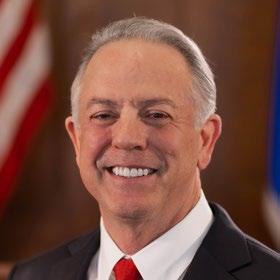
Gov. Joe Lombardo NEVADA CSG National President

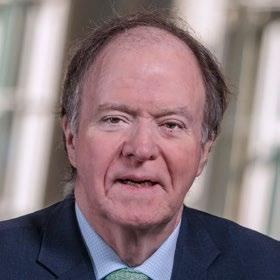
Rep. Kevin Ryan CONNECTICUT CSG National Chair
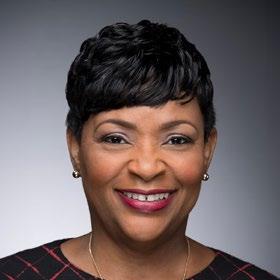
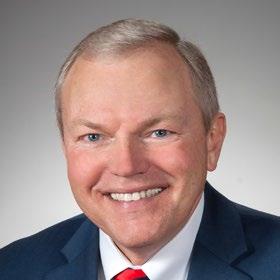

Sen. Bill Reineke OHIO CSG Midwest Chair
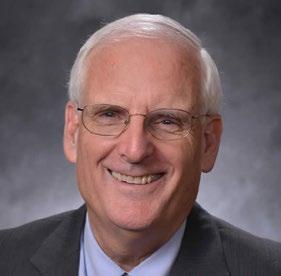

David Adkins CSG EXECUTIVE DIRECTOR/CEO dadkins@csg.org
David Biette
CSG EAST DIRECTOR dbiette @csg.org
Laura Tomaka
CSG MIDWEST DIRECTOR ltomaka@csg.org
Lindsey Gray CSG SOUTH DIRECTOR lgray @csg.org
Edgar Ruiz CSG WEST DIRECTOR eruiz@csg.org
Megan Quattlebaum CSG JUSTICE CENTER DIRECTOR mquattlebaum @csg.org
Shawn Jurgensen
CSG CHIEF PUBLIC POLICY OFFICER CENTER OF INNOVATION DIRECTOR sjurgensen@csg.org
Publisher
DAVID ADKINS dadkins@csg.org
Senior Editor
BLAIR HESS bhess@csg.org
Managing Editor
CODY PORTER cporter@csg.org
Associate Editors
TREY DELIDA tdelida@csg.org
LEXINGTON SOUERS lsouers@csg.org
Contributing CSG Staff Writers
ABEER SIKDER asikder@csg.org
RACHEL WRIGHT rachel.wright@csg.org
Graphic Designers
THERESA CARROLL tcarroll@csg.org
STEPHANIE NORTHERN snorthern@csg.org
JESSICA RUSHER jrusher@csg.org
Email capitolideas@csg.org
DAI NGUYEN press@csg.org
KATHERINE EMERSON press@csg.org
CSG CAPITOL IDEAS, ISSN 2152-8489, Issue 1, Vol. 80, No. 1 – Published four times annually by The Council of State Governments, 1776 Avenue of the States, Lexington, KY 40511-8536. Opinions expressed in this magazine do not necessarily reflect the policies of The Council of State Governments nor the views of the editorial staff. Readers’ comments are welcome.
Copyright 2024 by The Council of State Governments.
An accessible version of this publication is available upon request. Please email capitolideas@csg.org.
Sen. Bill Hansell OREGON CSG West Chair
Cam Ward ALABAMA CSG Justice Center Chair
Lt. Gov. Craig Blair WEST VIRGINIA CSG South Chair
Sen. Bill Ferguson MARYLAND CSG East Co-Chair
Del. Adrienne Jones MARYLAND CSG East Co-Chair
STAY CONNECTED x.com/CSGovts facebook.com/CSGovts linkedin.com/company/council-of-state-governments instagram.com/csgovts youtube.com/CSGovts



6 Hot Topics in 2024
Each year brings new challenges and innovative solutions for policymakers across the country. CSG experts identified five policy areas set to make a big impact in the coming year, including workforce development and infrastructure revitalization. Learn how CSG can help research and connect leaders with state-focused solutions.
10 Lessons of the Legislature: Constituent Services
Each year, newly elected state policymakers take on the monumental tasks involved with careers in public service. This year, CSG introduces a four-part series, “Lessons of the Legislature,” designed to assist new, up-and-coming leaders in their roles. The first part of this four-part series features discussion on constituent relations.
14 AI in the States
State leaders are grappling with a new and exciting tool: artificial intelligence. As policymakers race to regulate the emerging industry, they can look to their fellow legislators and industry experts for guidance. Since 2019, 17 states have enacted 29 bills focused on regulating the design, development and use of AI. These bills primarily address two regulatory concerns: data privacy and accountability.
18
Well Connected: 2024 CSG Leadership
CSG welcomes its 2024 national leadership team, including Connecticut Assistant Deputy Speaker Pro Tempore Kevin Ryan, who will serve as CSG National Chair. He and his fellow national officers spoke on the importance of leading CSG with bipartisanship and communication in mind — an effort that advances the organization’s mission to foster collaboration and the exchange of ideas amongst state leaders.
26 Reentry 2030
Reentry 2030 is a group-led national initiative supported by the CSG Justice Center that intends to advance the success of those leaving prison and those under supervision. States that join the initiative will receive the assistance and resources necessary to reach the concrete goals set to support the formerly incarcerated.
27 Is Daylight Saving Worth Saving?
Momentum to eliminate seasonal time changes seemingly faded after receiving House approval in 2022, leaving many Americans wondering if a nationally enacted standard time will ever come. Data suggests more than 60% of the country is in favor of such a move. A growing number of bills addressing the matter have appeared in legislatures across the country in recent years. In 2023 alone, 29 states considered legislation related to daylight saving time.
30 Meeting the Mental Health Needs of the Public Sector Workforce
Public sector workers — including civil service, public health, law enforcement and more — are essential to effective state government, as they provide important services for all residents. However, the weight of this critical work can take a heavy toll on their mental health. To address their needs, policymakers and community partners can increase access to vital supports that help state and local workforces address the unprecedented mental health crisis among government employees.
ISSUE 1 / 2024
26
FEATURES
ASK CSG
WHAT'S HAPPENING AT CSG 34 FINAL FACTS 2 ISSUE 1 2024 | CSG CAPITOL IDEAS
14
10
3
4
WHAT'S AT CSG HAPPENING
Apply or Nominate a Future CSG Toll Fellow
Each year, The Council of State Governments brings a new class of outstanding state officials to Lexington, Kentucky, to forge friendships and sharpen leadership skills as part of the CSG Henry Toll Fellowship. The five-day learning experience has been described by past Toll Fellows as “life changing,” and “the best leadership program I have ever attended.” CSG Toll Fellows come from all three branches of government. Twelve fellows are selected annually by a committee of Toll Fellow alumni from each of the four CSG regions. The 2024 CSG Henry Toll Fellowship will take place Sept. 6-10. CLICK TO LEARN MORE.
CSG Justice Center Research Contributes to 50-State Data Snapshot
The Justice Reinvestment Initiative, with technical assistance from The CSG Justice Center and the Crime and Justice Institute, compiled criminal justice data from 75 sources for all 50 states and the District of Columbia to provide policymakers and leaders with the necessary information to monitor trends more easily in their state. Each publication looks at key policy points, such as community mortality rates, health care and violent crime rates, among others. Experts from the Justice Center and the Crime and Justice Institute are available to provide briefings on data that may put state trends in context. The Justice Reinvestment Initiative is funded by the Department of Justice with support from The Pew Charitable Trusts and Arnold Ventures. CLICK TO LEARN MORE.
SHARE Act A Viable Solution to Licensure Compact Barrier
The continued success of interstate licensure compacts has been accompanied by intermittent difficulties for states and territories when conducting background checks through the FBI for an authorization to practice from an interstate compact. To alleviate this barrier, the bipartisan SHARE Act was introduced by U.S. Rep. Tracey Mann of Kansas, directing the FBI to provide criminal record history information to state agencies conducting a background check for the purposes of an interstate compact. Through February, the bill has received the support of 25 cosponsors from 15 states and one U.S. territory. The bill is a technical amendment to existing background check law. CLICK HERE TO LEARN MORE.
Championing Nonpartisan Excellence: Geary, Bolin Spearhead 2024 Initiatives for Legislative Directors
Jessica Geary of Alaska and Megan Bolin of Utah step into their respective roles as chair and vice chair of the CSG West Legislative Service Agency & Research Directors (LSA/RD) Committee. The committee offers a vital forum for nonpartisan legislative directors, fostering professional development, training and collaborative learning. Geary, appointed as the Alaska executive director of the Legislative Affairs Agency in 2018, and Bolin, currently the deputy director for the Utah Legislature’s Office of Legislative Research and General Counsel, bring their expertise to lead the LSA/RD Committee. The committee’s annual training seminar, scheduled for Oct. 7-9 in Park City, Utah, will focus on enhancing management skills and sharing innovative practices from nonpartisan offices across states. CLICK TO LEARN MORE.
Applications Open for the 2024 Western Legislative Academy
Each year, state legislators from the Western region are selected to participate in the Western Legislative Academy, a multi-day training experience focused on sharpening leadership skills in communications, consensus building, time management, ethics and more. Sessions are interactive and hosted by national leaders and academic authorities. Additionally, class members learn from each other allowing the opportunity to develop lasting relationships with legislative peers. The application period is now open for the 2024 WLA, which will take place Dec. 10-13 in Colorado Springs, Colorado. The deadline for completed applications is May 1. CLICK TO LEARN MORE.
Introducing the 2024 CSG West Officers
CSG West is excited to introduce its 2024 officers who, in coordination with the Executive Committee and CSG West Director Edgar Ruiz, will lead the organization’s efforts this year. Oregon Sen. Bill Hansell now serves as CSG West chair, which will include hosting the 2024 CSG West Annual Meeting in Portland, Oregon. Hansell has been active with CSG at the national and regional levels, including as a member of the CSG Future of Work National Task Force and former chair of the CSG West Legislative Council on River Governance. Wyoming Rep. Mike Yin rotated into the role of chair-elect, while Utah Sen. Todd Weiler became vice chair. CLICK TO LEARN MORE.
4 ISSUE 1 2024 | CSG CAPITOL IDEAS
CSG South Publishes ‘2024 Issues to Watch’
As 2024 legislative sessions get underway, the CSG South policy team, under the auspices of six CSG South standing policy committees, identified current and emerging trends relevant to policymakers across the South. Included is discussion of such topics as artificial intelligence implications for the agricultural sector, food insecurity, economic development in the energy sector, banking issues related to the marijuana industry, and school choice accountability and assessments. CLICK TO LEARN MORE.
CSG South Policy Analyst Selected for 2024 AI Catalyst Fellowship
CSG South Senior Policy Analyst Cody Allen was named to the 2024 Cohort of EDSafe AI Alliance of Catalyst Fellows. The AI Catalyst Fellowship is a year-long program that supports exceptional and impact-minded individuals by providing an outstanding platform to learn and work on questions of AI in education. Fellows will work with world-renowned experts in AI safety, ethics and policy. They also participate in a rigorous seminar series, where they learn about the latest advances in AI research and discuss the potential impacts of AI on society. CLICK TO LEARN MORE.
CSG South Chair Initiative to Focus on Permitting Reform
West Virginia Senate President Craig Blair recently announced his initiative as 2024 CSG South Chair. This year, he looks to focus on permitting reform as a solution for states who face federal roadblocks. Blair also sponsored a Senate Concurrent Resolution that urges the federal government to enact reforms promoting new energy infrastructure, independence and resilience. His initiative is seconded by other policymakers. A CSG South survey identified permitting reform as a top issue among Southern state leaders. CLICK TO LEARN MORE.
CSG East Mourns Loss of Former New Hampshire Representative, ELA Graduate
Former New Hampshire Rep. Suzanne Smith passed away in early January. A fixture in the Legislature from 2008 until her retirement in 2022, Smith was a long-time member of the CSG East Agriculture and Rural Affairs Committee. She was also a member of the Eastern Leadership Academy, graduating in 2013, and was active on the CSG East Energy and Environment Committee. Smith’s fellow legislators credited her love for nature for her sponsorship of many bills protecting natural resources in New Hampshire, including those addressing the state’s lakes, greenhouse gas emissions, composting and rail trail management. CLICK TO LEARN MORE.
Housing Issues Headline Perspectives 2023-2024
The 2023-2024 edition of CSG East Perspectives has launched, offering a thorough review of several policy issues. A survey conducted earlier in 2023 answered what Eastern region members believed to be the most pressing issue: housing. Coverage of this particular issue leads the way for the latest edition of Perspectives, featuring discussion from regional leaders and experts on new ideas to address the housing crisis. Other issues discussed include solutions for improved literacy rates, infrastructure to support the

2024 CSG Henry Toll Fellowship
growth of electric vehicles, HBCU funding gaps and options to overcome farm labor shortages. CLICK TO LEARN MORE.
Applications Open for 2024 ELA Program
Applications for the 2024 Robert J. Thompson Eastern Leadership Academy are now accessible. The 2024 ELA program, slated for Aug. 25-29, will gather 30 state and provincial officials from the 18 CSG Eastern Region member jurisdictions in Philadelphia. This select group of state officials from all three branches of government receives training to enhance their leadership and communication skills from a variety of experts in media, education and government. The deadline to apply is May 15. CLICK TO LEARN MORE.
Columbus to Host 78th Annual MLC Meeting
The 78th Annual Meeting of the Midwestern Legislative Conference will be July 21-24 in Columbus, Ohio. Led by Ohio Sen. Bill Reineke, who serves as the MLC Chair, the meeting will provide opportunities for legislators to meet and learn from their colleagues across the Midwest, as well as from policy experts and acclaimed speakers. Information about registration and hotels can be found under the events tab at csgmidwest.org. CLICK TO LEARN MORE.
BILLD Application Deadline
Applications for the Bowhay Institute for Legislative Leadership Development, the Midwestern Legislative Conference’s professional development program for newer legislators, are due by April 15. This five-day program will be held Aug. 23-27 in Madison, Wisconsin. More information, as well as online and PDF applications, are available at csgmidwest.org/billd. CLICK TO LEARN MORE.
Renewable Energy Siting Focus of Recent MLC Committee Report
As renewable energy supplies an increasing portion of electricity, states must deal with the tension between meeting clean energy goals and policies on how and where wind and solar facilities should be built. The Midwestern Legislative Conference’s Energy & Environment Committee has published an in-depth report on Midwestern state siting laws for wind and solar energy facilities. This brief, and one on states’ actions to address the fentanyl health crisis, are available at csgmidwest.org. CLICK TO LEARN MORE.
SEPT. 6–10 | LEXINGTON, KY APPLY TODAY!
1 CLICK HERE TO APPLY 5 ISSUE 1 2024 | CSG CAPITOL IDEAS
Deadline to apply is May
2024 Hot Topics in 2024 Hot Topics in
By Lexington Souers
Leaders face workforce shortages, infrastructure growth and a federal election in the coming year
Many state legislatures are convening in 2024 to discuss complex public policy issues and to find proactive solutions. Renewed focus on workforce, artificial intelligence, health, infrastructure and the environment are among the top issues of bills submitted so far this year.
Expert-supported remedies for these challenges include the use of federal funding to create new jobs in technology and infrastructure, the utilization of individuals with disabilities and apprenticeships to address workforce challenges, the implementation of interstate compacts to address occupational licensure mobility, and regulation to manage the potential benefits and harms of artificial intelligence.
At The Council of State Governments, policy work in these areas continues. In 2024, public policy and research departments in offices across the country — alongside the CSG National Center of Innovation and CSG National Center for Interstate Compacts — will implement a renewed emphasis in the areas of health, fiscal policy, education and other utilities including infrastructure, transportation and the environment.
Read more to see what public policy issues are surfacing across the country this year and to learn more about how CSG is working for the states in these areas.

WORKFORCE
Ensuring Americans have fulfilling, focused careers will continue to be of interest to policymakers. The impact of COVID-19, the departure of workers from the workforce and other concerns continue to exacerbate the worker shortage across states. With caregivers and aging employees choosing to refocus their energy, along with a smaller population of teenagers seeking employment or higher education, policymakers and employers understand the importance of workforce development. Other trends include helping entry level workers advance in their roles, apprenticeship, skillsbased hiring, and a focus on technology and digital skills.
Amanda Bergson-Shilcock, a senior fellow at the National Skills Coalition, said policymakers can pull from either a state’s general fund or from federal funds to creatively approach workforce development.
“One thing state legislators can do is take advantage of the provisions in federal law that let them spend a chunk of those infrastructure dollars on workforce development,” BergsonShilcock said. “States can kind of take that money and run with it, doing creative and entrepreneurial and exciting things with it. If states have a vision for … building a clean energy workforce or building a broadband infrastructure workforce, put that vision out there and get the [federal government] to sign off on that as a use of federal funding.”
Focusing on external factors is another solution, according to Bergson-Shilcock. Meeting fundamental needs, like housing or child care, may help fill vital roles with the community. One approach is providing a resource coordinator to help connect job seekers with resources that may not traditionally fall under education and workforce policy. Bergson-Shilcock also said communicating existing workplace supports and marketing them to promote interest can help policymakers, employers and job seekers.
“At CSG, we understand the importance for states to have a growing and thriving workforce,” said Lindsay Lucas, a CSG project manager with the Center for Advancing Policy on Employment for Youth (CAPE-Youth). “Through our work, we help states create, improve and expand pathways to employment. Whether it is looking at expanding apprenticeships or identifying factors that are impacting the workforce, we are a resource to states when it comes to workforce development.”
Lucas encourages state leaders to reach out to learn more about how CSG can support their workforce goals. Interested individuals can receive assistance via email at research@csg.org.

ISSUE 1 2024 | CSG CAPITOL IDEAS 6

INTERSTATE COMPACTS
In alignment with the focus on workforce, states are continuing to ease licensing constraints on a mobile workforce through interstate compacts. Interstate compacts create reciprocal professional licensing practices between states, while ensuring the quality and safety of services and safeguarding state sovereignty. These agreements allow individuals with occupational licenses to navigate between states various requirements and quickly enter a new workforce.
Compacts surrounding mental health continue to grow in popularity, especially as states face an increasing need for highly qualified practitioners. Even though mental health services are in high demand, state borders and individual licensing requirements can limit the services providers can offer.
“Access to care and workforce shortages are key issues facing states,” said Matt Shafer, deputy policy director at the CSG National Center for Interstate Compacts. “Compacts represent a flexible tool that policymakers can leverage to make improvements to health care in their state.”
States that adopt occupational licensure compacts allow for increased portability of licensure for mental health professionals, while also supporting military families and improving access to services. Compacts are successful because they remove barriers to licensure because states agree to uniform minimum standards. With the rise in telehealth, especially for mental health practice, compacts are increasingly helpful.
The CSG National Center for Interstate Compacts offers compact education, development and administration for states. NCIC has facilitated the development of occupational licensing compacts that address counseling, psychology, social work and more. As of February, the Counseling Compact has reached 33 member states within three years of becoming available to states, while the Psychology Interjurisdictional Compact, known as PsyPact, has 41 member states. Just this year, the Social Work Compact has been filed in 22 states and is already enacted in Missouri and South Dakota States interested in learning more about occupational licensure compacts are encouraged to visit compacts.csg.org or contact the CSG NCIC via email at compacts@csg.org.

TECHNOLOGY
Rising interest around artificial intelligence has led policymakers to implement new approaches to the emerging technology. State leaders are taking a thoughtful and curious approach to AI regulation, as much of the technology’s potential is unknown. Several states, including Texas, implemented a task force to study AI and offer best practices for the state. AI policy is unique in that states may opt to take both a broad and specific approach depending on the issue. For example, several state lawmakers are focusing on the use of deepfakes in political ads or in sex abuse material. Because AI is so new, policymakers may need to reexamine regulation and rely on input from industry leaders and task force members. More information on AI governance can be found in "AI in the States," located on page 14.
State leaders are also looking to increase digital literacy and proficiency. Digital literacy allows individuals to “find, evaluate, create, and communicate information, requiring both cognitive and technical skills,”according to the American Library Association. Increasing a population's ability to understand data allows for more specific use of funds or actions, resulting in a higher impact. Cities across the U.S. use “data academies”to teach employees at all levels about the importance of data and how it’s use can make jobs easier. Indiana has a statewide program through the Office of the Indiana Chief Data Officer. These programs provide accessible and approachable content, and, following an assessment, provides employees proof of their proficiency. Data analysts also warn that without increased literacy, AI technology may not be as useful.
There is also an increased interest in teaching digital literacy, especially as it pertains to social media, in schools. Florida lawmakers passed HB 379 (2023), introducing sixth to 12th grade students to some of the dangers of social media and how students can stay safe while online. New Hampshire and Virginia have similar plans.

7 ISSUE 1 2024 | CSG CAPITOL IDEAS

INFRASTRUCTURE
A rise in storms, floods and natural disasters has led some policymakers to look to hardening infrastructure to better protect citizens. Common weather patterns that intensify and become severe can place pressure on infrastructure that is naturally reaching the end of its life.
Trina Sheets, executive director at National Emergency Management Association, said hardening infrastructure is essential for communities adapting to increasing and intense climate related disasters.
“Hardening infrastructure is a proactive and strategic approach to disaster preparedness that aims to mitigate the impact of disasters, protect lives, maintain essential services, and contribute to the overall resilience of communities and regions,” Sheets said.
Funding climate-resilient infrastructure is key for policymakers who may look to their Department of Transportation and other government agencies for grant funding. Gas taxes, which long sustained infrastructure and roadway projects, are proving to be a less reliable source of funds, especially with the rise in public transit and electric vehicles. Oregon, Pennsylvania and Utah are implementing changes to each state’s respective gas tax, providing other lawmakers a test case for future action.
Critical Infrastructure, including broadband and increased funding, is needed to not only physically connect people, but to also provide subsidies that are critical for access. States are able to utilize billions of dollars in federal funding to enhance technology through updating cable and 5G resources, among other telecommunication services. Additionally, the expansion of broadband and other telecommunications avenues creates jobs and provides citizens with access to stable internet connection and other resources.

ENVIRONMENT — ELECTRIC VEHICLES
The U.S. is the world’s second largest market for electric vehicles, otherwise known as EVs. As consumers and the federal government drive interest, state leaders are working to support a growing market. The federal government set a goal that half of all vehicles sold in 2030 would be zero-emission vehicles. This push, along with $5 billion in funding from the 2022 Bipartisan Infrastructure Act, encouraged states to build infrastructure and adjust requirements for car manufacturers.
Nearly every state offers incentives for the use of EVs, but only 13 require car manufacturers to sell a certain number of electric or emissions free vehicles a year. As of Jan. 17, legislators have filed 44 bills concerning EVs, covering topics from infrastructure to tax credits. Policy solutions include incentives, rebates and grants for purchasing EVs or supporting related infrastructure. Still, states face challenges in meeting the needs for rural communities, including access to charging stations.
The infrastructure needed to meet consumer needs for EVs may slow down the rapid growth. Consumers may be hesitant to buy in because of struggles to find charging stations and the initial cost of vehicles. Additionally, charging stations may offer different power levels and charging times. Communities can use readiness planning, which connects stakeholders — like city departments, utilities and local businesses — to set goals on EV infrastructure. The Department of Transportation also provides grants to help communities meet their unique needs, including increased charging sites, signage and access for underserved communities.
The switch to EVs may have a larger impact on infrastructure, as less fossil fuel use depletes gas tax revenue. Gas tax revenue typically goes to road upkeep and safety. States may transition to taxing vehicles by the mile or imposing fuel taxes on commercial charging stations.
In Kentucky, lawmakers passed a 3-cent raise per kilowatt to help with the loss of gas tax revenues. Additionally, Georgia lawmakers passed a tax on public chargers. This revenue, along with a higher registration fee for electric vehicles, would go toward transportation infrastructure.

8 ISSUE 1 2024 | CSG CAPITOL IDEAS

ENVIRONMENT — PFAS
Per- and Polyfluoroalkyl Substances, known as PFAS, are manufactured chemicals used since the 1940s. Seen as a way to protect industry and household items, the chemicals are now known as “forever chemicals” because of their slow decomposition. These thousands of chemicals now contaminate the environment and are linked to serious health concerns, including increased cholesterol, decreased birth weight, and kidney and testicular cancer. However, the wider risks of PFAS are unknown, despite studies from the Environmental Protection Agency and the Food and Drug Administration.
At least 23 states are renewing their approach to banning PFAS, or forever chemicals, with a growing number seeking to ban the use of them in cosmetics, textiles and household items. In 2019, Maine created a task force to explore PFAS contamination to better direct state efforts and legislation. Broad regulation of the pervasive chemicals continues to be a challenge for states. Legislation instead focuses on specific products, most notably the 12 states that banned the sale of PFAS containing firefighting foam and Minnesota, which brought forth several bills addressing PFAS, including a ban on the chemical’s use in cookware, dental floss and menstrual products
Minnesota Rep. Sydney Jordan said her state’s history with PFAS creation and production, as well as community research and support for banning the chemicals, helped legislation succeed. She added that the bill, known as Amara’s Law, received bipartisan support, in part due to the apparent effects of the chemicals on communities. Despite success, Jordan acknowledged there is still work to do.
“These are not like chemicals that just happened to be in our water because of geology or hydrology,” Jordan said. “These are problems because of human-made chemistry. Minnesotans introduced this to our own water. They’re called forever chemicals because now we’re stuck with them … Last year, what we did was turn off the tap so we could start to drain the bathtub. The bathtub is still full of PFAS.”
CSG East held roundtable sessions on the issue at its 2023 Annual Meeting and Regional Policy Forum in Toronto, and also hosted a panel at the CSG National Conference in December. In April, they are moving forward with a larger summit. Those interested in learning more about the work CSG East does on PFAS policy can contact Chris Keller via email at ckeller@csg.org.

ELECTIONS
This November, voters across the nation will gather at their local polling locations to cast their ballots in a federal election. This influx of voters can lead to stress on local systems and logistics. Elections officials are watching to see how federal and state funding will affect offices already struggling to fully staff their offices.
“Article I, Section 4 of the U.S. Constitution places the administration of federal elections on states,” said Casandra Hockenberry, a CSG project manager with the Overseas Voting Initiative. “States are responsible all aspects of state and federal elections in their state, typically without any financial support from the federal government. This means no two states or territories conduct elections in the same way and election officials must find innovative approaches to successfully conduct elections.”
In addition to issues associated with financial support, a 2023 Brennan Center study showed elections officials also feel less safe performing their duties. Between swatting, doxxing, fentanyl-laced envelopes, and a series of bomb threats aimed at secretaries of state, election officials report feeling less safe at work. A number of states are considering legislation on criminalizing harassment and attacks on election officials and offices.
Aging voting machines are also among concerns, especially as Congress only provided $75 million for elections, barely making a dent in the nearly $600 million needed to replace machines. Outside of this year’s election, officials face steep costs into the future. According to a study by MIT Election Lab, the cost to fully fund elections administration this decade would cost at least $53 billion shared between county, state and federal governments.
Pressure on officials to report results quickly and accurately, while also under scrutiny, may lead to increased wait times for unofficial results. Some states allow for ballots to be preprocessed, cutting down on the time needed to release unofficial results. Experts worry that there will be increased challenges to or efforts to disrupt certification results. Challenges followed elections in 2020 in New Mexico, Pennsylvania and Arizona, but were resolved through a court order.
Stay up-to-date on elections throughout the year with the expansive offering of informative resources provided at election.csg.org

9 ISSUE 1 2024 | CSG CAPITOL IDEAS

FOR NEW LEGISLATORS
Lessons of the Legislature
CONSTITUENT RELATIONS
Each year, newly elected state policymakers take on the monumental tasks involved with careers in public service. To assist new, up-and-coming leaders, CSG introduces a four-part series, “Lessons of the Legislature.” This series will offer insight on the legislative process from senior state policymakers and veteran staff members. The first part of this four-part series features discussion on constituent relations.
Constituents — they are colleagues, employees, neighbors, peers and even family. A common thread shared by all constituents is their reliance on elected public officials to serve as their advocate, voicing concerns and interests to the government on their behalf.
This challenging task involves communicating with the people elected officials represent to learn and understand how to best serve them in their respective communities. This engagement takes on many forms, including legislative tours, meet and greets, newsletters, postcards, social media, surveys and more.
Although approaches vary, a public official’s forward-facing representation of constituents is key in upholding their role as contributors to a successful democracy. Connecting with the leaders serving them not
HAVE QUESTIONS OR SEEKING RESOURCES?
CSG is here to help. For assistance, connect with us via email at research@csg.org.
only builds trust for constituents, but it also cultivates a familiarity that can allow them to view their leaders in a more civil, human manner.
The fostering of these types of relationships requires buy-in from more than just the public official. It’s a partnership. As such, constituents must first be equipped with the proper tools. For instance, educating constituents on the policymaking process, provide program resources relevant to their interests, establish the most efficient lines of communication for yourself and your staff, and make clear what can or cannot be accomplished in your role.
“Connecting with constituents is such an important aspect of being an elected official that I simply encourage [public officials] to not get too busy to do it,” said Denese Sampson, director of constituent services for Georgia Lt. Gov. Burt Jones. “There is a saying from the great tennis player Arthur Ashe, who said, ‘Do what you can, use what you have, start where you are.’ If something doesn’t work, try something else and keep it going until you find what works for you. But it simply must be done. Constituent services is at the heart of being an elected official, and it would be self-defeating to get too busy, or too important, for it to get the attention it so deserves.”
Sampson, a veteran staff member of the Georgia Senate for more than 25 years, became the director of constituent services after 10 years as Jones’ legislative assistant. This time working together allowed Jones to observe Sampson’s profound ability to manage people and situations. She is one of five legislators and legislative staff to offer their expertise to new leaders on effective constituent relations.
Learn more about the many aspects of constituent relations from Sampson and others in their discussion with CSG.
10 ISSUE 1 2024 | CSG CAPITOL IDEAS
Featured Speakers



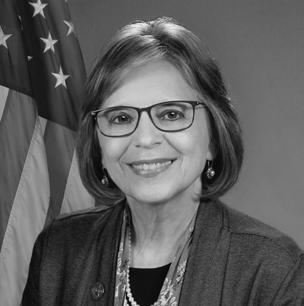
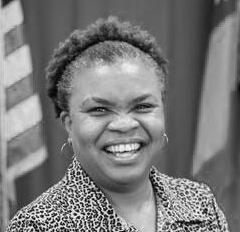
DENESE SAMPSON Director of Constituent Services Office of Lt. Gov. Burt Jones Georgia
Educating Your Constituents
ARNDT: It is important for constituents to understand how the legislative process works so that they understand how best to advocate for their issues and have their voices heard. The more they know, the better they can participate in the process and be effective.

LUPARDO: There is enormous value for both sides … I am usually focused on concerns constituents have expressed to me, or on pressing local or state matters. It’s important for them to know that I am actively engaged in problem solving or advancing new initiatives on their behalf. It’s also important to involve constituents in the policymaking process on issues that I need their help with. This is not only to garner their support, but to ask for their assistance in raising awareness about the topic.
Building Relationships
SAMPSON: Educating constituents is vital to keeping clear and honest lines of communication with the constituents you serve and the general public. Better informed constituents tend to communicate more effectively and are more likely to show appreciation and offer support. Young and newly elected legislators should have a list of personal legislative priorities, with an explanation of why those priorities should be important to constituents.
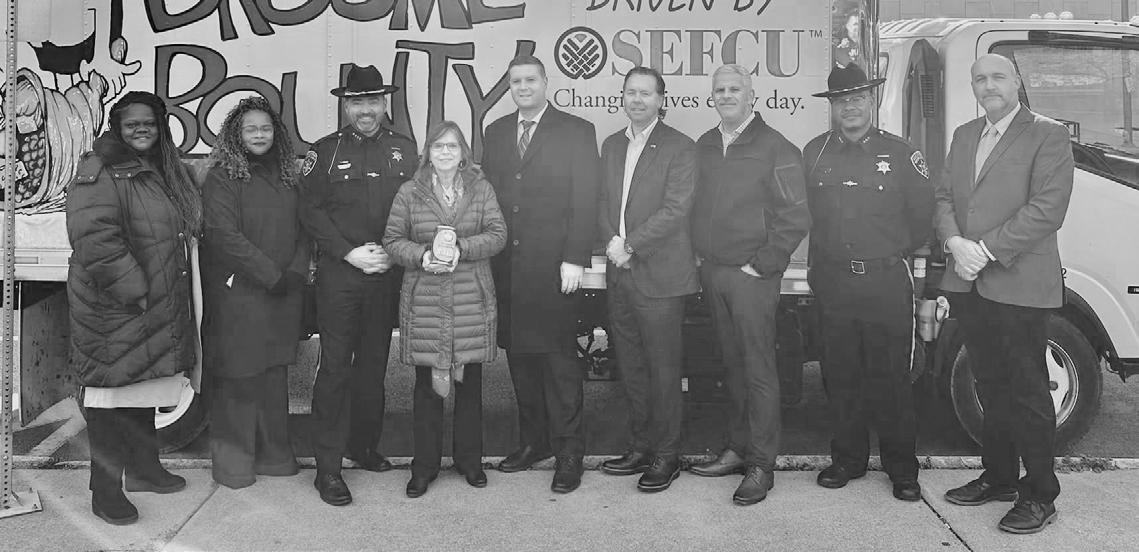
BOWERS: Sometimes our titles get in the way of how people communicate with us, like the titles of senator or congressman. Truly, we are real life people, and that’s what I try to portray here in my district in Kansas of 13 counties … I truly believe the secret of the job is you have to be one of where you come from. It is just that simple when you’re a citizen legislator. You’re communicating with your people just like they’re [your] neighbors, no matter what county they’re in in my district … I’m a car dealer, too, so [to me] constituent service is customer service.
LUPARDO: During the COVID pandemic, we created a program called Nourish New York, where surplus food was purchased from upstate farmers for food pantries in New York City. Afterward, downstate legislators were interested in visiting and thanking the farmers who produced the food, which, in many cases, saved lives in their district. Those relationships have built a deeper understanding of the challenges our farming community is facing, resulting in greater support for the industry.
SAMPSON: Expect for most citizens to be completely unaware of the full legislative process. This lack of knowledge can be an opportunity for connection and should be addressed in a way that is not condescending, but helpful. In my experience, most people are very thankful for gaining knowledge and being enlightened.
MEAGAN ARNDT Senior Legislative Assistant Washington
ELAINE BOWERS Senator Kansas
SAM HUNT Senator Washington
DONNA LUPARDO Assemblywoman New York
Washington Sen. Sam Hunt, who served as CSG National Chair in 2022, reviews notes from the Senate’s late January session with Meagan Arndt, his senior legislative assistant.
Photo credit: Angela Kerndl, Washington Senate Democratic Caucus
New York Assemblywoman Donna Lupardo (fourth from left) poses with other state and local leaders in Binghamton, New York, during the Downtown Thanksgiving Food Challenge in November.
11 ISSUE 1 2024 | CSG CAPITOL IDEAS
Photo credit: Christina Fuller, New York State Assembly
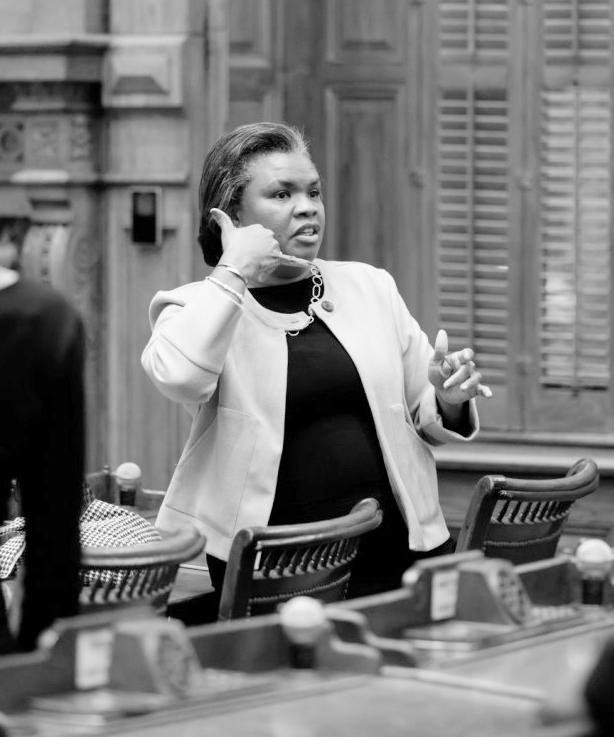
Managing Expectations
ARNDT: Even if you are unable to address a constituent’s specific issue, there are likely other resources that may assist them. For example, we may have someone contact us about their unemployment case and the claim is on appeal pending a hearing. Because of this, they in turn may need help with emergency funds for rent or utility assistance. We can direct them to those other resources. You may not be able to address their immediate need, but you can point them in the right direction.
LUPARDO: We always assure constituents that we will try our best to get to the bottom of their personal concern, or will explore pending legislation or other relevant initiatives. We always let them know if we reach a roadblock that cannot be overcome or need more documentation or organized advocacy. It’s of course always more difficult when a constituent is actively opposed to a policy that I support. Some can be more reasonable than others.
In-Person Interaction
ARNDT: It is impactful to hear stories from constituents in their own words; to learn from their expertise; to understand how a proposal may affect them. In-person communication is more personal. I think the constituents also really appreciate connecting with us in a more meaningful way. It’s informative and we always learn something.
LUPARDO: Over the years, I have sponsored fewer public forums and town hall meetings due to safety concerns. I do however participate in numerous forums sponsored by organizations, and regularly speak to high school and college classes. I also never miss a community celebration or festival. All of this is enormously beneficial.
SAMPSON: In my experience, constituents are more amenable to listening to ideas they oppose or support in one-on-one encounters. So, if there is a group of citizens together, I would suggest that a legislator to connect with one person, either with a question or statement that can be universally agreed upon, then slowly build consensus from that one connection.
SAMPSON: I personally believe that scheduling a meeting to speak directly with an elected official is the best way to clearly convey a message or opinion … In-person connections are extremely valuable and preferred. I have worked with wonderful senators who welcome the opportunity to speak with a person who opposes them or downright dislikes them. Those encounters almost always turned into positive experiences, where the person ultimately expresses appreciation and support for the senator. I highly encourage legislators to not shy from those encounters with people who, at first meeting, may not support you or your platform. You may be missing out on an opportunity to flip a person to your side.
 Dense Sampson explains Georgia’s use of sine die to her classmates during the 2023 Staff Academy for Government Excellence (SAGE) in Atlanta on Nov. 15. SAGE is a professional leadership development program for Southern state legislative, judicial, executive and agency staff.
Photo credit: Shannon Belletti
Kansas Sen. Elaine Bowers (left) joins host Becky Kiser and fellow lawmakers, including Rep. Ken Rahjes, for the first episode of The Kansas Legislature by Smoky Hills PBS on Feb. 2.
Dense Sampson explains Georgia’s use of sine die to her classmates during the 2023 Staff Academy for Government Excellence (SAGE) in Atlanta on Nov. 15. SAGE is a professional leadership development program for Southern state legislative, judicial, executive and agency staff.
Photo credit: Shannon Belletti
Kansas Sen. Elaine Bowers (left) joins host Becky Kiser and fellow lawmakers, including Rep. Ken Rahjes, for the first episode of The Kansas Legislature by Smoky Hills PBS on Feb. 2.
12 ISSUE 1 2024 | CSG CAPITOL IDEAS
Photo credit: Smoky Hills PBS
Connecting Outside the Legislature
ARNDT: Personalized messaging is very important, especially with the large volume of email messages each office receives. If there is a personal message, it is much more likely to be responded to with a personal message. If we receive hundreds of emails with the same subject line, those may get counted and filed, depending on if they are from constituents, or responded to with the same, non-personalized response.
BOWERS: I do a weekly column. Some of my newspapers — I would say two thirds of them — print it. It’s true news. There’s no spin. It’s not politics. This is what happened in the Senate. Ever since I’ve come in — these past 18 years — I’ve done one once a week.
There are also things like challenge coins. They’re based on the military and are about two inches [in diameter]. Jay Emler, who was formerly the Kansas Senate majority leader [and former CSG National Chair in 2012], had his own coin that said, ‘Senate Majority Leader’ on one side and had the great seal of Kansas on the other. They’re gold and just beautiful. I order and try to give those to veterans, in particular, because they understand their value.
HUNT: I came in right on the cusp of the computer — the electronic era, really, as far as legislators are concerned. Communication was principally by letter, postcard and telephone. We have and still have a legislative hotline and 800 number that people can call. That used to be the preset, preeminent way that people would contact their legislator. We’d have staff answering the phones with a blue sheet for each email that came in that included the caller’s name, address, phone number and issue. Once every day or so, we would get a stack of those blue sheets delivered to our office and we would try to address them by phone, mail or whatever. Now, it’s probably 99% email.
LUPARDO: We now receive hundreds of form letters from constituents on specific topics related to the state budget and pending legislation. We also receive major email blasts from national constituent groups focused on issue areas under consideration in the Agriculture Committee that I chair. For example, when one assemblymember filed a bill that would have banned rodeos in New York, we heard from every cowboy in America. Email is now the main way that constituents communicate with us.

Welcoming Staff Support
ARNDT: We have had legislative liaisons working for our state agencies for many years. They are the first point of contact when we receive constituent casework pertaining to a state agency. Some of the bigger agencies also have a dedicated “constituent services” staff and a process to ensure the constituent inquiry/issue gets to the correct department within the agency to be addressed. It is really valuable to have one point of contact and a process to track constituent casework and ensure resolution.
HUNT: One thing that is a real difference among states is that I have three staff people to assist in what we do — in meeting with constituents and in answering mail. Obviously, it’s close to overwhelming for a new legislator who comes in and tries to figure out, ‘Who do I respond to? Who don’t I respond to? Who do I meet with?’ The inclination is if somebody wants a meeting, I have to set up a meeting. And pretty soon you’re going to back-to-back-to-back meetings for eight or 10 hours a day and you’re exhausted by Wednesday afternoon or before. So, it’s important to have staff to help you.
SAMPSON: When I came to the Senate in 1996, handwritten letters were the most received, and responded to, forms of communication. Email correspondence has naturally become the most dominant form of communication. Regardless of the change, people seem to remain very adamant about receiving responses to their emails. And not just a canned response – a meaningful response.
LUPARDO: Make sure that the person who receives and triages incoming phone calls is trained in handling matters that are often emotional. They are the frontline of the operation and have to express compassion, while being able to cope with angry people who call to vent. We always try to approach everyone who calls with grace, which is sometimes easier said than done.
Sen. Sam Hunt hosts a group of young constituents in his office during their tour of the Washington State Legislature in January.
13 ISSUE 1 2024 | CSG CAPITOL IDEAS
Photo credit: Angela Kerndl, Washington Senate Democratic Caucus

Guiding Principles for States
As a starting point, policymakers can address AI governance by identifying the principles with which the design, development and use of AI systems should align. To guide states in these efforts, the White House Office of Science and Technology Policy issued the “Blueprint for an AI Bill of Rights” in October 2022. The Blueprint states that AI systems should be designed, developed and deployed according to principles that bolster democratic values, protect civil rights, preserve civil liberties and ensure privacy.
Those principles, as defined by legal scholars, AI technologists and the White House, can assist state policymakers in trying to ensure that AI governance aligns with the objectives detailed in the Blueprint. They include interdisciplinary collaboration, protection from unsafe or ineffective systems, data privacy, transparency, protection from discrimination and accountability.
An additional resource, the “Artificial Intelligence Risk Management Framework,” was published in January 2023 by the U.S. Department of Commerce’s National Institute of Standards and Technology (NIST). This guidance document, which was developed with direction from Congress, included input from private- and public-sector organizations that may seek guidance in managing the risks associated producing AI technologies. NIST has also since published its “AI RMF Playbook, “AI RMF Roadmap” and “AI RMF Crosswalk.”
AI Guiding Principles
Commonalities in the recently published work of many legal scholars, AI technologists and the White House suggest that sound policy governing the design, development and use of AI:
Ensures that the design, development and use of AI is informed by collaborative dialogue with stakeholders from a variety of disciplines.
Protects individuals from the unintended, yet foreseeable, impacts or uses of an unsafe or ineffective AI system.
Protects individuals from abusive data practices and ensure that they have agency over how an AI system collects and uses data about them.
Ensures that individuals know when and how an AI system is being used and provide users with an option to opt out of an AI system in favor of a human alternative.
Protects individuals from discrimination and ensure that AI systems are designed in an equitable way.
Ensures that those developing and deploying AI systems are complying with the rules and standards governing AI systems and are being held accountable if they do not meet them.
Addressing AI Regulation in the States
As laboratories for innovation, states have taken many different approaches to regulating AI systems that align with these guiding principles. Over the past five years, 17 states have enacted 29 bills that focus on AI regulation. Of these bills, 12 have focused on ensuring data privacy and accountability. This legislation hails from California, Colorado, Connecticut, Delaware, Illinois, Indiana, Iowa, Louisiana, Maryland, Montana, New York, Oregon, Tennessee, Texas, Vermont, Virginia and Washington.
STATE LEGISLATION: INTERDISCIPLINARY COLLABORATION
Illinois, New York, Texas and Vermont have enacted legislation that seeks to ensure the design, development and use of AI is informed by collaborative dialogue with stakeholders from a variety of disciplines.
Illinois (HB 3563, 2023)
New York (AB A4969, 2023; SB S3971B, 2019)
Texas (HB 2060, 2023) Vermont (HB 378, 2018)
Through this legislation, states have established task forces, working groups or committees to study the potential impacts of AI systems on consumers, as well as to identify potential public sector uses and cyberse -
15 ISSUE 1 2024 | CSG CAPITOL IDEAS
“Curiosity doesn’t mean doing nothing; it doesn’t mean just letting the industry do whatever the industry wants to do. It means using this period to gather information to understand how the products and policies work in practice, so, as we move forward, we can get smarter and smarter about regulation over time.”
—
Matt
Perault,
director at the c enter on t echnology P olicy at the U niversity of n orth c arolina at c ha P el h ill

curity challenges. These bodies have also been tasked with recommending legislation or regulation to protect consumers.
In June 2023, the Texas Legislature enacted HB 2060 (2023), establishing an AI advisory council consisting of public and elected officials, academics, and technology experts. The council was tasked with studying and monitoring AI systems developed or deployed by state agencies, as well as issuing policy recommendations regarding data privacy and preventing algorithmic discrimination.
STATE LEGISLATION: PROTECTION FROM UNSAFE OR INEFFECTIVE SYSTEMS
Four states have enacted legislation to protect individuals from any unintended, yet foreseeable, impacts or uses of unsafe or ineffective AI systems.
California (AB 302, 2023)
Connecticut (SB 1103, 2023)
Louisiana (SCR 49, 2023)
Vermont (HB 410, 2022)
As part of such legislation, policymakers have directed state agencies to analyze AI systems currently in use and issue a report to their respective governor regarding potential unintended or emerging effects and potential risks of these systems. As part of this report, states are asked to outline policies or “codes of ethics” that seek to address identified concerns.
Connecticut policymakers passed SB 1103 (2023) with bipartisan support. The bill requires state agencies to review any use of AI and to ensure the technology does not discriminate against anyone and that it is fiscally responsible. The bill also established a working group to make recommendations for future AI use.
Connecticut Rep. Holly Cheeseman cosponsored the bill and said acknowledging the benefits of AI, while also maintaining an ongoing assessment of its use, was an important part of the bill that also helped encourage bipartisan support.
“I think this was something that people were pretty comfortable with,” Cheeseman said. “We’re not saying you can’t use artificial intelligence in government departments, but if you’re going to do it, you have to do it in this very thoughtful and reasonable way that requires a continuous assessment. You can’t just buy something off the shelf and say, ‘That’s it. We’re done.’ You have to be aware that even with good things, there can be effects that you hadn’t foreseen that may, in some cases, discriminate or otherwise hurt the people you were aiming to help.”
STATE LEGISLATION: DATA PRIVACY
In 11 states, enacted legislation protects individuals from abusive data practices and ensures that they have agency over how an AI system collects and uses data about them. Abusive data practices include the inappropriate, irrelevant or unauthorized use or reuse of consumer data.
California (AB 375, 2018)
Indiana (SB 5, 2023)
Tennessee (HB 1181, 2023)
Colorado (SB 21-190, 2021)
Iowa (SF 262, 2023)
Texas (HB 4, 2023)
Connecticut (SB 6, 2022)
Montana (SB 384, 2023)
Virginia (SB 1392, 2021)
Delaware (HB 154, 2023)
Oregon (SB 619, 2023)
State approaches to ensuring data privacy center around the ability of consumers to opt-out of “profiling” if it furthers a system’s automated decision-making processes in a way that produces “legal or other similar significantly effects.” Effects may include unfair or deceptive treatment of consumers; negative impacts on an individual’s physical or financial health; and provision of financial and lending services, housing, insurance or education, among other things.
Indiana Sen. Liz Brown, who authored SB 5 (2023), said the legislation focused on how consumers can protect their personal information.
“I think that we need to continue to move into this space and maybe do some regulation, but we have to be soft,” Brown said. “With the legislation I introduced last year, we wanted to start slowly, but carefully. We don’t want to create a David and Goliath [situation] where new businesses can have mistakes because we’ve made it so prohibitive. On the other hand, we want to make sure that it’s not the Wild West. I think I think everybody agrees that we don’t know enough about the good and bad of AI.”
STATE LEGISLATION: TRANSPARENCY
Three states and New York City (2021/144, 2021) have enacted legislation to ensure that individuals know when and how an AI system is being used.
California (SB 1001, 2023)
Illinois (HB 2557, 2019)
Maryland (HB 1202, 2020)
State approaches ensuring transparency in the use of AI systems include requiring employers or businesses to disclose when and how an AI system is being used. In some instances, an employer may be required to receive consent from an employee prior to utilizing an AI system that collects data about them.
In Illinois, HB 2557 (2019) requires an employer to notify and receive consent from job applicants prior to conducting a video-recorded interview that may be analyzed by AI to determine their fitness for the position. Employers are also required to provide applicants with advanced notice of how an AI system will be used and outline what types of characteristics the system will use to evaluate applicants.
16 ISSUE 1 2024 | CSG CAPITOL IDEAS
“We’re not saying you can’t use artificial intelligence in government departments, but if you’re going to do it, you have to do it in this very thoughtful and reasonable way that requires a continuous assessment.”
— Rep. Holly Cheeseman, c onnectic
U t

STATE LEGISLATION: PROTECTION FROM DISCRIMINATION
Three states have enacted legislation to protect individuals from discrimination and ensure that AI systems are designed in an equitable way. This includes algorithmic discrimination, whereby an AI system contributes to the unjustified different treatment of people based on their race, color, ethnicity, sex, religion or disability, and more.
California (SB 36, 2019)
Colorado (SB 21-169, 2021)
Illinois (HB 0053, 2021)
State legislators have primarily sought to protect consumers from algorithmic discrimination by requiring those that develop or deploy AI systems to assess these systems for potential bias.
California is one such example. In 2019, the California Senate enacted SB 36 (2019), which requires criminal justice agencies that utilize AI-powered pretrial risk assessment tools to analyze whether they produce disparate effects or biases based on gender, race or ethnicity. Pretrial risk assessment tools are used to determine the likelihood that a defendant will fail to appear in court or carry out new criminal activity, thereby impacting whether they are released or detained.
Further, some states have expressly prohibited those deploying AI systems from using biased data generated by AI in various decision-making processes. For example, Colorado SB 21-169 (2021) prohibits insurers from using consumer data and information gathered by AI systems in a way that discriminates based on race, color or sexual orientation, among other things.
STATE LEGISLATION: ACCOUNTABILITY
Legislation enacted in 12 states ensures that those developing and deploying AI systems are complying with the rules and standards governing AI systems and are being held accountable if they do not meet them.
California (AB 375, 2018)
Indiana (SB 5, 2023)
Tennessee (HB 1181, 2023)
Colorado (SB 21-190, 2021)
Iowa (SF 262, 2023)
Texas (HB 4, 2023)
Connecticut (SB 6, 2022)
Montana (SB 384, 2023)
Virginia (SB 1392, 2021)
Delaware (HB 154, 2023)
Oregon (SB 619, 2023)
Washington (SB 5092, 2021)
To ensure accountability, states are incorporating compliance and accountability measures into existing data privacy laws governing AI systems.
Tennessee is one instance in particular, with HB 1181 (2023) implementing various data privacy measures related to “profiling,” and requiring those developing or deploying AI systems to conduct impact assessments that are intended to identify foreseeable negative or disparate impacts resulting from the collection and use of consumer data. The bill also gives the Tennessee Office of the Attorney General and Reporter authority to impose civil penalties on those who do not comply with the law.
Washington is yet to pass data privacy laws that explicitly govern AI systems. However, the state has established a working group to study how “automated decision-making systems can be reviewed and periodically audited to ensure they are fair, transparent and accountable.” Such working groups can help state policymakers identify effective compliance and accountability frameworks prior to inclusion in AI data privacy laws.
Looking Forward: What Can We Expect to See from States?
Since 2018, the number of AI-related bills proposed and enacted in state legislatures has grown. States such as California, Colorado and Virginia have laid the groundwork for establishing AI-related data privacy laws, as well as measures aimed at enforcing these laws. States can turn to policy recommendations from existing AI-focused task forces and working groups to better understand how to address AI-related issues in their local context. Backed by his own experiences and work, Perault has come to believe curiosity is among the keys to the ongoing AI-related efforts of state leaders. “Curiosity means recognizing that there’s an enormous amount we don’t know. Therefore, we need to have an affirmative regulatory position that enables us to learn as we go into generating information,” Perault said. “So, curiosity doesn’t mean doing nothing; it doesn’t mean just letting the industry do whatever the industry wants to do. It means using this period to gather information to understand how the products and policies work in practice, so, as we move forward, we can get smarter and smarter about regulation over time.”
Do you have a policy issue that you would like to know more about? Ask CSG! We're happy to assist you with your request. Reach us via email at research@csg.org.
17 ISSUE 1 2024 | CSG CAPITOL IDEAS

WELL CONNECTED
2024 CSG National Officers impart importance of communication, compromise with constituents, peers in demonstrating effective leadership
By Trey Delida, Cody Porter and Lexington Souers
18 ISSUE 1 2024 | CSG CAPITOL IDEAS

2024 CSG NATIONAL CHAIR
REP. KEVIN RYAN

CONNECTICUT
Assistant Deputy Speaker Pro Tempore
Rep. Kevin Ryan moved with his family to Connecticut at age 6. What followed a “typical childhood” is an extraordinary career in public service. Ryan, the 2024 CSG National Chair, has served Connecticut as a legislator for more than 30 years, in addition to years of experience working with his community’s board of education, Rotary Club, Knights of Columbus and other local organizations.
Throughout his long career in public service, Ryan pulled from lessons he learned from his father, who was a local businessman. His father, he said, was a hard worker who valued customer service and fiscal responsibility; however, his parents were conscious of their spending, both in business and at home. Growing up with a father who ran his own business cemented the importance of small businesses for Ryan.
“It reflects in a lot of my decisions,” Ryan said. “I keep in mind the small business owner since that’s who I’m most familiar with, and really recognizing a lot of people consider business owners to be honest. A lot of them are very hardworking individuals who are just trying to be able to pay their bills and take care of their families.”
Ryan joined the Connecticut House of Representatives in 1992 with encouragement from members of the community. His decision was supported by the experience he gained on both the local board of education and in speaking with legislators about issues facing a health care clinic where he worked.
Working in his community allowed Ryan to bring a focus of constituent service to his role in the statehouse. These professional experiences helped Ryan see how the state affected patients’ and students’ lives at the local level.
In his more than 30 years in office, Ryan said that his focus on constituents hasn’t changed. He was appointed assistant deputy speaker pro tempore in 2023, allowing him to continue his focus on constituents in a new leadership role. During that time, what has changed is the avenues of communication. Social media created a new avenue to bring issues and awareness to a new audience. Additionally, the rise of the internet has allowed constituents to connect with the legislative process more.
“As time has gone on, we’ve been able to allow people to watch our committee meetings, procedures and be in the House chamber online,” Ryan said. “They could watch it directly, where before they’d have to wait until it came out in the paper. To have gone on to be able to be streamed on a computer, it’s a lot more accessible now. They can see how government works on a day-to-day basis and they can actually witness the processes that bring laws about for them.”
This communication also transfers to his work with other legislators. Listening to other legislators and remaining flexible are two things Ryan said are key to success in the Legislature.
“I think, at least in Connecticut, we’ve always been pretty good at being able to effectively come out with a compromise,” Ryan said. “It’s very rare when that doesn’t happen. Unfortunately, it can’t happen 100% of the time. There are just some issues where there’s either one way to do it or another. But, more often than not, we’re easily able to come up with something that’s kind of midstream and that comes from a lot of conversations.”
ISSUE 1 2024 | CSG CAPITOL IDEAS 19
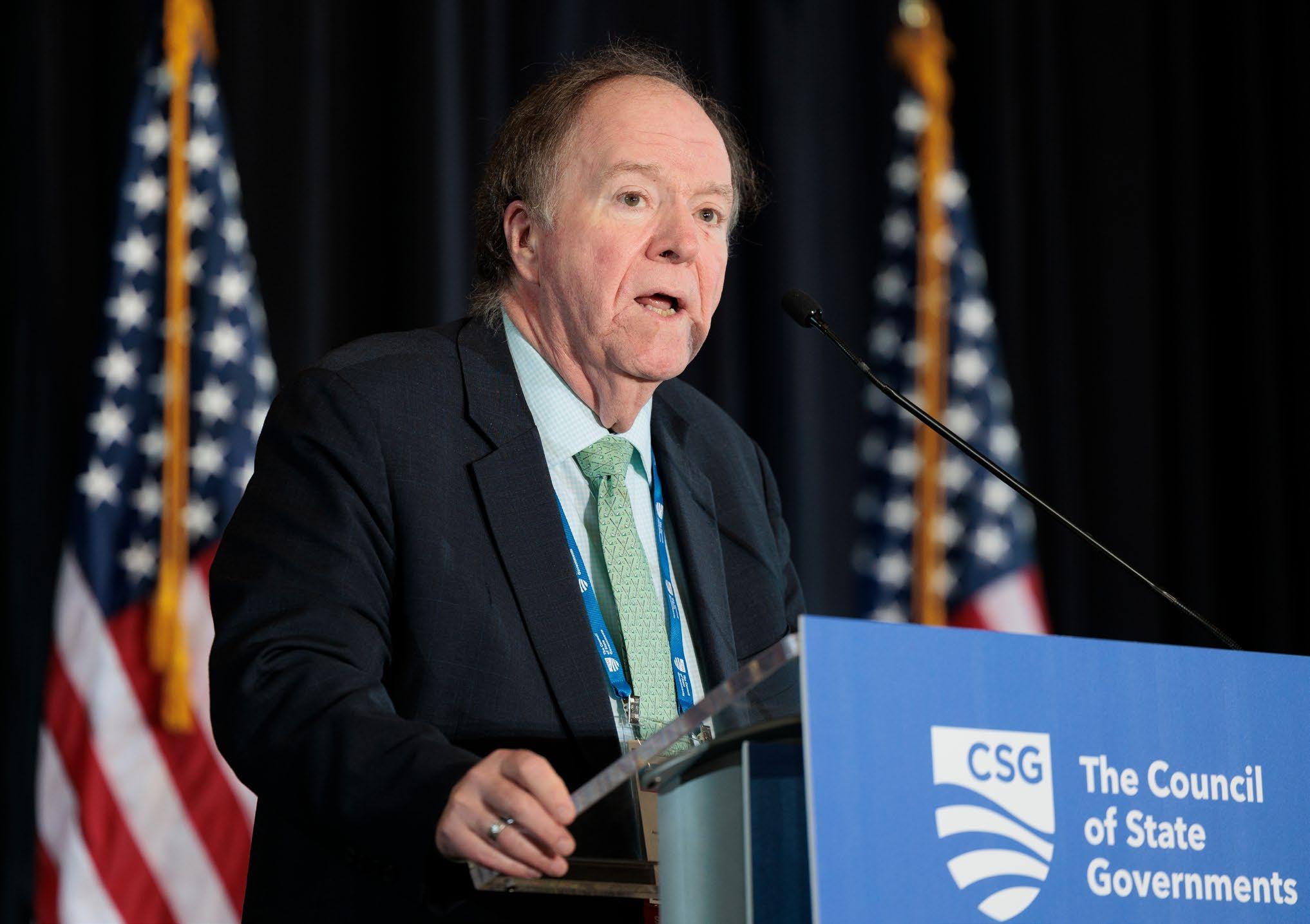

On that note, Ryan suggested new legislators adopt an open-minded viewpoint and “recognize that other people come from different types of backgrounds and have different experiences that lead them to what they believe in.” He added that listening and respect for others should be incorporated in every decision.
Outside of the statehouse, Ryan is a professor of physics at the University of New Haven. He said he doesn’t think his students know he’s a legislator and that he wants to keep them focused on the classroom. Teaching has further shown him the importance of patience and listening to students to better answer their questions.
One example of listening came from a young constituent and her family. In 2012, Connecticut legislators legalized medical marijuana. However, in 2016, one of Ryan’s constituents explained how their minor child was excluded from use, causing the family to travel to Maine to receive care.
“When we talk about an issue that limits very few people in the state, this was definitely one,” Ryan said. “We had to make people aware of how important it was to this family and how important it was for the health of this child — and we were able to do that. Eventually, the bill passed. It was legalized for
people — young people — so those who need or want to have access to medical marijuana can have it.”
This is just one example of a small issue that still needed constituent support. Ryan said it’s important to make people aware of how important some small actions are to members of the community.
During his time in office, Ryan said many issues have come from his constituents or from areas of community concern. For example, he is focused on accessible health care, and providing affordable living conditions and transportation in the more rural, eastern Connecticut district he represents.
“Unfortunately, we don't get to choose the issues we are passionate about because people — your constituents — sometimes bring you issues that are important to them,” Ryan said. “[Those issues] then become important to you because you have to deal with problems that these people have. You have to kind of do what you can to remedy them.”
Ryan began his involvement with CSG leadership in 2022 as CSG National Vice Chair. He was a 2008 CSG Henry Toll Fellow and 2009 graduate of the CSG East Robert J. Thompson Eastern
ISSUE 1 2024 | CSG CAPITOL IDEAS 20
Rep. Kevin Ryan, Connecticut assistant deputy speaker pro tempore and 2024 CSG national chair, speaks to his fellow state leaders at the 2023 CSG National Conference in Raleigh, North Carolina, in December. Ryan was confirmed to his CSG leadership role at the national conference by the CSG Executive Committee and Leadership Council, comprised of his colleagues in state governments across the country.
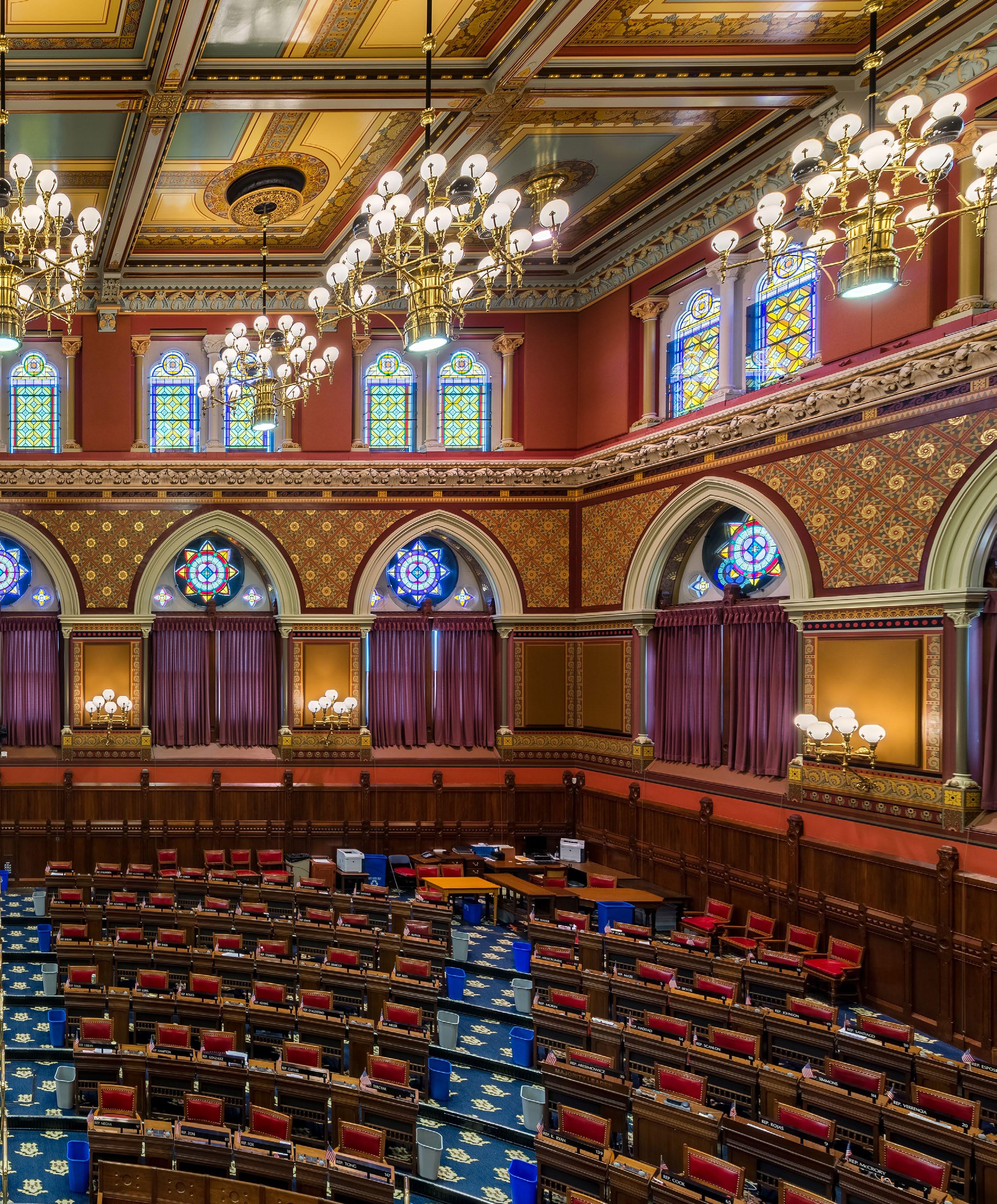
Leadership Academy. This year, Ryan will serve as CSG National Chair. In the year ahead, he looks forward to discussing regional issues at a national level.
“I think it's interesting to compare the issues that are important in Connecticut with what kind of issues are important across the country,” Ryan said. “While there's a lot of commonalities, it's still always interesting to find what particular issue is more important in one region than in another. I’m just looking forward to working with the regions to see what's important to them and what we can do to help them to deal with their issues.”
Among the areas of importance for Ryan was highlighting the unique mission of CSG to connect leaders across the country.
“I think it's important that nobody lives in a bubble,” Ryan said. “We have to be able to have those streams of communication between different entities in different states. It's important that we all work together effectively because it not only helps you, but it helps the country as a whole.”
DID YOU KNOW?
Ryan is a CSG Toll Fellow and graduate of the CSG Eastern Leadership Academy.
Not only is Ryan a professor of physics, he also has bachelor’s degrees in biology and English, a doctorate in optometry, a certificate in public health and a master’s degree in community psychology.
IN 31 YEARS, RYAN HAS SPONSORED 321 BILLS. As a world traveler, he has visited 42 countries.
RYAN PLAYS THE ALTO SAXOPHONE.
CONSTITUTION STATE
FAVORITES WITH REP. KEVIN RYAN
What is your favorite thing about Connecticut?
RYAN: I think the shoreline, the seafood, the beautiful sunsets, and being able to sail and be off and out in the water. That's probably one of the best things.
Do you have a favorite meal or regional specialty?
RYAN: I love lobster. I'll eat lobster day and night. I just love it. That's something that comes from my parents, who are big lobster eaters. We always had lobster and I still love it — stuffed especially — although I'll eat it any way it comes.
Is there a place everyone should visit in Connecticut?
RYAN: I'm going to go with the Mark Twain House and Museum because it represents his life well. He was a great author that had national and international impact. I think it's one of the most interesting places you can visit in Connecticut. The Harriet Beecher Stowe House is right next to it, so they make a good complement to see two sites in one.
What makes people from Connecticut unique?
RYAN: I think it’s that open-mindedness — their willingness to be able to look at both sides of an issue when discussing any issue and seeing things from all aspects.
ISSUE 1 2024 | CSG CAPITOL IDEAS 21
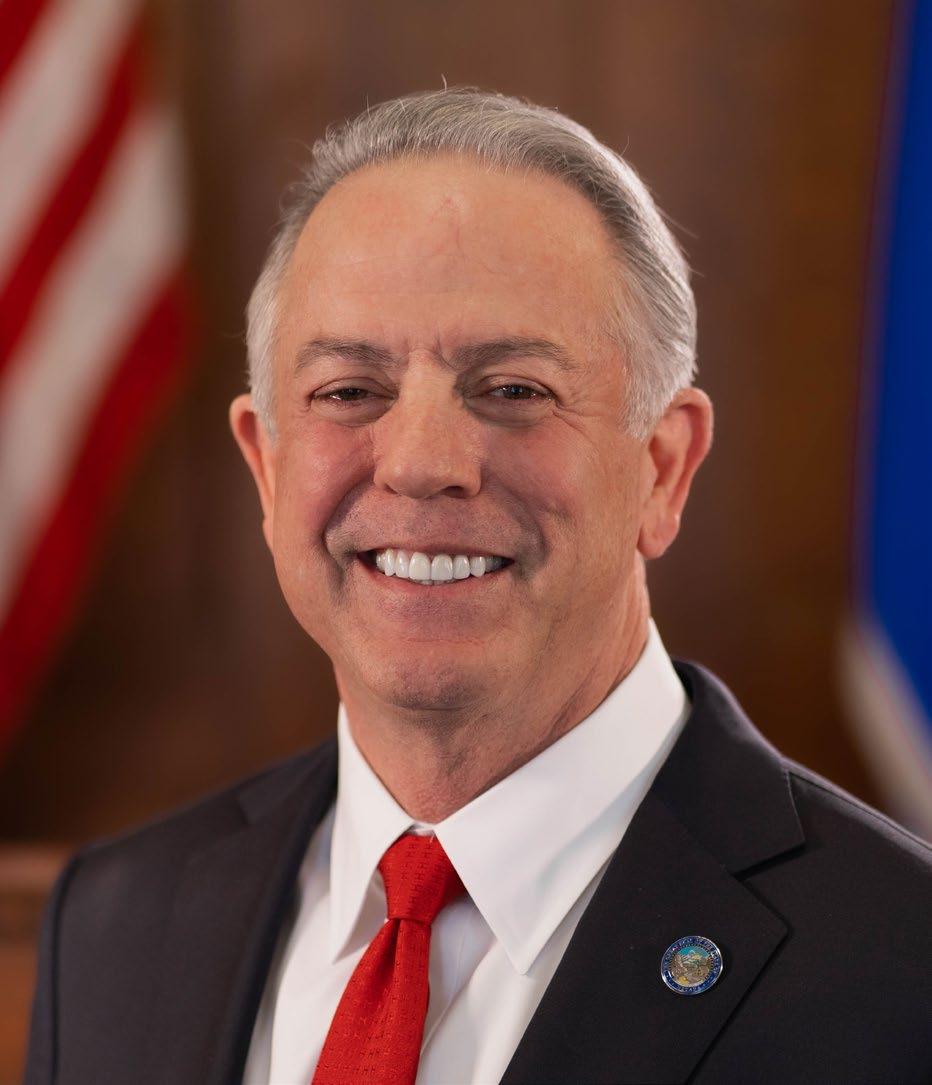
Nevada Gov. Joe Lombardo has long prioritized providing protection and service to others. This approach established the foundation for a career that continues to be on the rise, with his most recent success coming in November 2022 upon getting elected as the Silver State’s 31st governor.
As governor, Lombardo’s striving to introduce improvements to Nevada’s economy and education system, while also remaining attentive to community safety efforts statewide. Since November, he and the Nevada Governor’s Office of Economic Development have announced new capital investments that project to bring the state 840 new jobs in the next two years.
Lombardo added an achievement to his resume on the national level in December by succeeding Delaware Gov. John Carney as the 2024 CSG National President. His transition to the role began at the CSG National Conference.
The son of a U.S. Air Force veteran, Las Vegas has been deeply ingrained in Lombardo’s identity since he was a teenager, when he
DID YOU KNOW?
Lombardo was born in Japan, where he lived for more than a decade.
HE APPEARED ON AN EPISODE OF COPS DURING HIS TIME AS A LVMPD OFFICER.
2024 CSG NATIONAL PRESIDENT
GOV. JOE LOMBARDO
NEVADA

and his family settled at Nellis Air Force Base. His earliest service efforts came as a member of the U.S. Army and Nevada National Guard, soon after graduating with a bachelor’s degree from the University of Nevada, Las Vegas.
Lombardo’s career is largely prided in his 30 years of service as a member of law enforcement. His work in this capacity began in 1988 with the Las Vegas Metropolitan Police Department. After gaining experience as a sergeant, lieutenant and captain, he became assistant sheriff in 2011.
By 2014, Lombardo looked to make his next major career move by running for and getting elected as sheriff of Clark County, the largest county in Nevada. He was later re-elected in 2018. His service to Clark County included managing a $1.3 billion budget, up to 6,000 employees, more than two million residents and up to 100,000 daily visitors.
LOMBARDO HAS ONE GRANDSON, TEDDY.
On multiple occasions, he has raced in the SCORE International off-road racing series.
In 2006, Lombardo earned his master’s degree in crisis management from UNLV.
ISSUE 1 2024 | CSG CAPITOL IDEAS 22
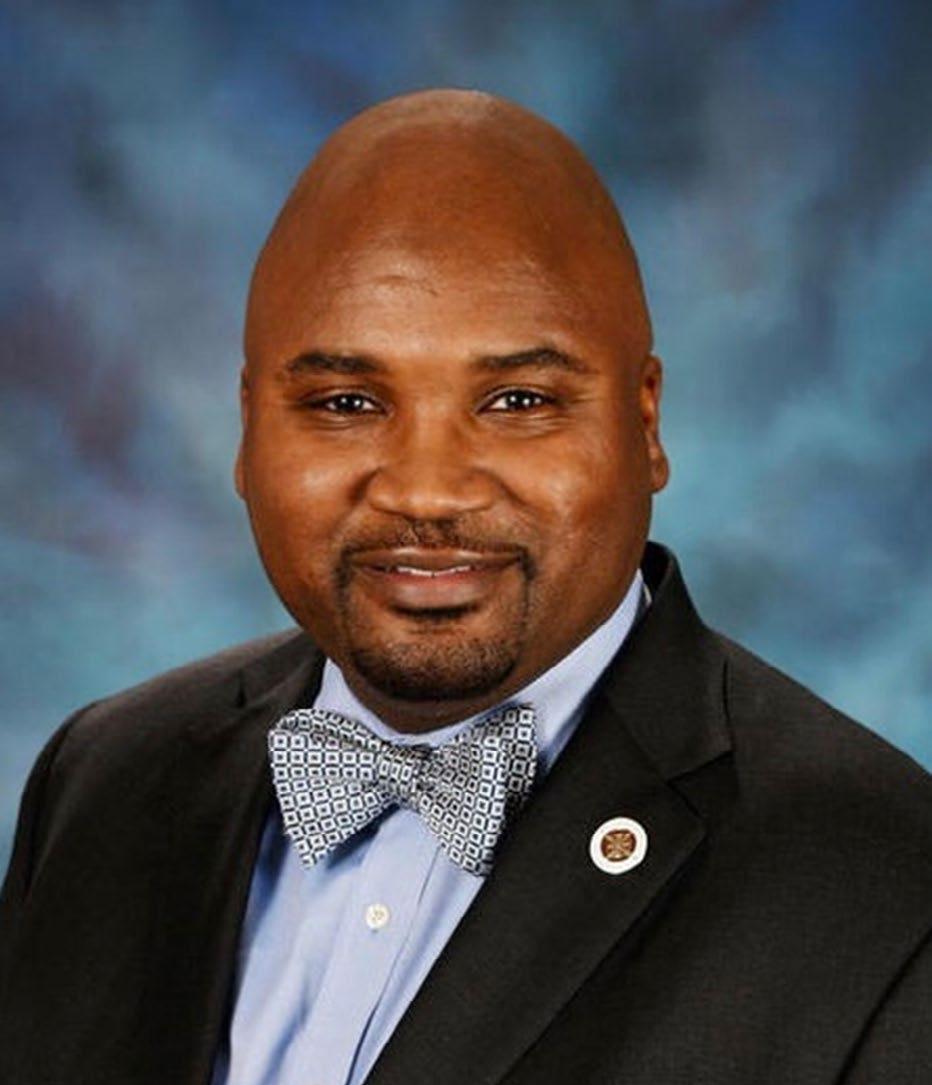
Sen. Elgie Sims has an extensive history with CSG, dating back to 2014 with his graduation from the CSG Midwest Bowhay Institute for Legislative Leadership Development. He then graduated from the CSG Henry Toll Fellowship in 2015, thus embarking on his journey of leadership.
In 2019, Sims was selected to serve as chair of the Midwestern Legislative Conference before being nominated by his peers to join the CSG Executive Committee, resulting in his selection as 2023 CSG National Vice Chair.
“I think CSG is uniquely positioned as a nonpartisan organization focused on excellence in state government to create opportunities for discussion that can occur in an authentic way to help forward policies that create pathways to understanding,” Sims said.
DID YOU KNOW?
Sims gifted more than 300 Ring doorbell cameras to senior citizens in his community to enhance their safety and security.
In the past 21 years, Sims has sponsored nearly 1,300 bills. Collectively, his work has most often addressed crime and law enforcement (424 bills), law (349 bills) and education (346 bills).
2024 CSG NATIONAL CHAIR-ELECT
SEN. ELGIE SIMS
ILLINOIS

Throughout Sims' career, he has shown dedication to the communities of Illinois, both as a community leader and a public servant. He got his start in public service representing the 34th District in the Illinois House of Representatives from 2012-18. Sims later transitioned to his current role as senator for the 17th District, representing Chicago’s south side, south suburbs, and Will and Kankakee counties.
As a senator, Sims has championed legislation to create economic opportunities for residents and focused on the enhancement of the education system to foster the future of his community.
Sims worked as a budget analyst for former Illinois Senate President Emil Jones Jr. after earning his bachelor’s degree from Illinois State University.
HE AND HIS WIFE SHIVONNE HAVE TWO DAUGHTERS, KENNEDY AND MACKENZIE.
He has worked to deliver books and scholarships to children located in the communities he serves.
ISSUE 1 2024 | CSG CAPITOL IDEAS 23
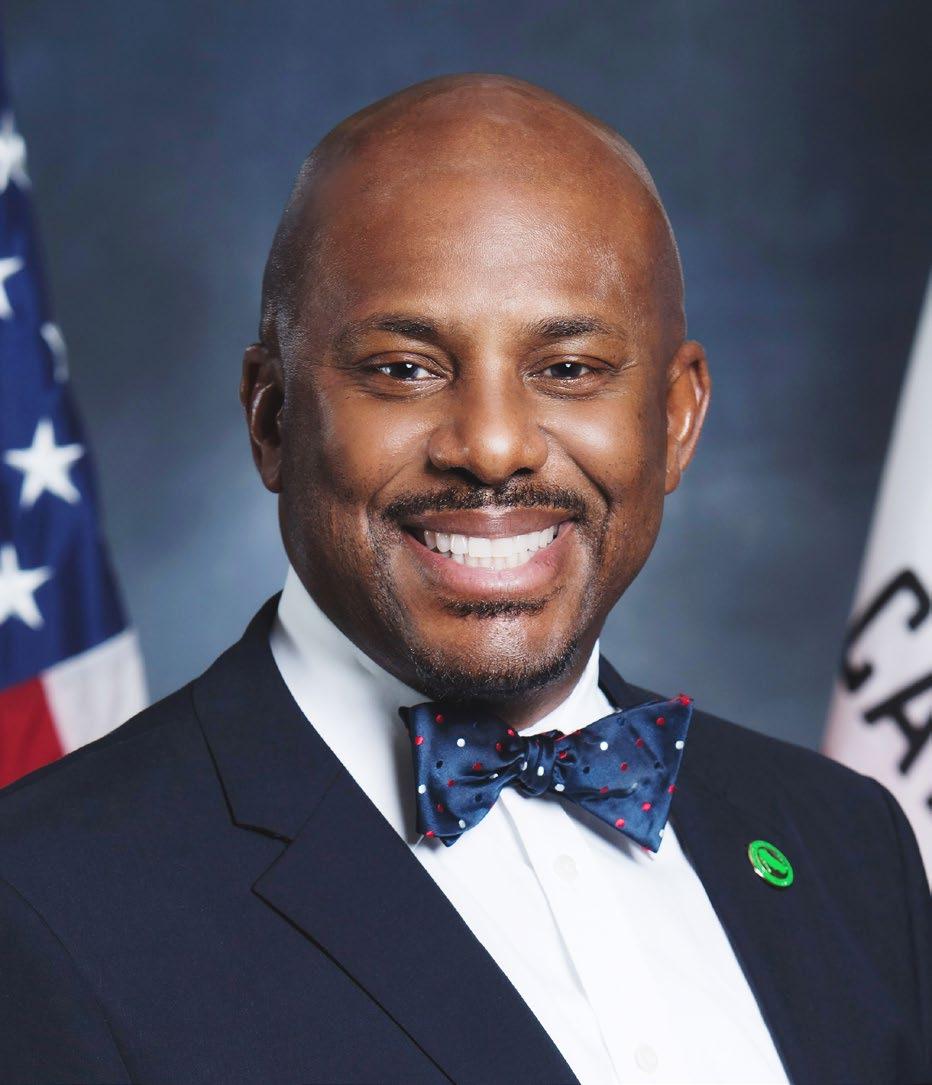
2024 CSG NATIONAL VICE CHAIR
DID YOU KNOW?
Gipson chairs the California State Assembly Committee on Arts, Entertainment, Sports, and Tourism.
HE ROUTINELY PARTICIPATES IN MARATHONS.
For nearly a decade, Gipson served as mayor pro tempore for Carson, California. He has previously been named “Legislator of the Year” by the California Association of Black Lawyers.
AMONG HIS PAST JOBS, GIPSON WORKED AT TACO BELL.
ASSEMBLYMEMBER MIKE GIPSON
CALIFORNIA
Since his election to represent California’s 64th Assembly District in 2014, Assemblymember Mike Gipson has worked with his constituents on everything from criminal justice reform to affordable housing.
In 2015, Gipson was appointed by Assembly Speaker Emeritus Anthony Rendon to serve as Assembly Democratic Caucus Chair. He served until July 2023, making him the caucus' longest-serving chair in California history.
He has also been an active voice and champion of The Council of State Governments. In 2023, Gipson served as a regional officer

for our western region, where he worked closely with CSG West Director Edgar Ruiz.
"Being elected as the 2024 National Vice Chair of The Council of State Governments is both a tremendous honor and responsibility,” Gipson said. “I am committed to fostering collaboration among state officials and leveraging our diverse perspectives to address the pressing issues facing our nation. Together, we will build bridges, forge solutions, and ensure a brighter future for all. I am grateful for the opportunity and excited to embark on this journey of service and leadership."
ISSUE 1 2024 | CSG CAPITOL IDEAS 24


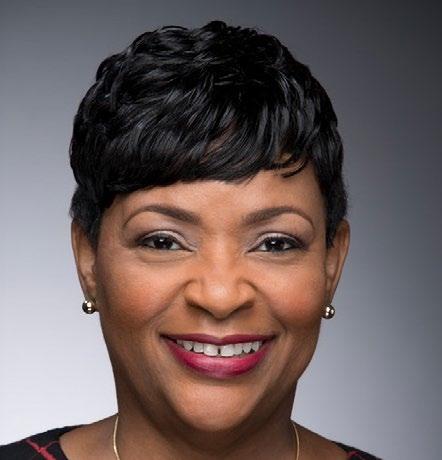


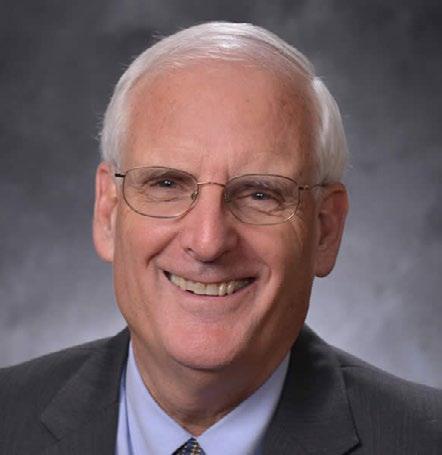
SEN. BILL FERGUSON
MARYLAND | SENATE PRESIDENT | CSG EAST CO-CHAIR
A native of Silver Spring, Maryland, Ferguson now represents District 46, located entirely in Baltimore City. In 2020, he was elected as Senate president, becoming the second youngest elected to the role in state history. Ferguson also serves as chair of the Legislative Policy Committee and as a member of several other committees, including the Rules and Executive Nominations committees, as well as the Legislative Redistricting Advisory Commission.
DELEGATE ADRIENNE JONES
MARYLAND | SPEAKER OF THE HOUSE | CSG EAST CO-CHAIR
Jones joined the Maryland House of Representatives more than 20 years ago. Upon her election as speaker in 2019, she became both the first woman and African American elected to serve this role in the House. Jones is co-chair of the Legislative Policy Committee and serves on the Spending Affordability Committee, among others.
SEN. BILL REINEKE
OHIO | CSG MIDWEST CHAIR
Following three terms in the Ohio House of Representatives, Reineke was elected in 2020 to represent the Senate’s 26th District. His commitment to workforce development is captured through his work as a member of the Governor’s Executive Workforce Board. Reineke’s other contributions have come as chair of the Energy and Public Utilities Committee and as vice chair of the Transportation Committee.
SENATE PRESIDENT/LT. GOV. CRAIG BLAIR
WEST VIRGINIA | CSG SOUTH CHAIR
Blair, a 22-year veteran of state government in West Virginia, was unanimously elected as Senate president in 2021 and again in 2023. With the role comes the added responsibility of serving as lieutenant governor. First elected to the House of Delegates in 2002, Blair served four terms before getting elected to serve Senate District 15 in 2012. Currently the Rules Committee chair, his past committee work includes chairing the Finance Committee and serving as majority whip.
SEN. BILL HANSELL
OREGON | CSG WEST CHAIR
Having served over 40 years in elected office, on both local and state levels, Hansell is no stranger to public service. He is currently serving his third four-year term representing one of the largest districts in the Oregon Legislature. Before his election to the state Senate in 2012, Hansell worked for three decades as Umatilla County commissioner, and served as president of the National Association of Counties.
ISSUE 1 2024 | CSG CAPITOL IDEAS 25
2024 CSG REGIONAL LEADERS

REENTRY 2030 REENTRY 2030
A national initiative supported by the CSG Justice Center
By Lexington Souers
More than 1.2 million people are incarcerated in the United States, with 96% of those individuals sentenced to more than a year. Reentry 2030 is a group-led national initiative supported by The Council of State Governments Justice Center that takes a human-centered, coordinated, transparent and equitable approach to improving success for those exiting prison.
“Each individual exiting jail or prison deserves to reintegrate into their communities successfully,”said Dr. Nicole Jarrett, director of corrections and reentry at The Council of State Governments Justice Center “With Reentry 2030, we aim to build on the successes from the Second Chance Act and similar initiatives to work for a future of reentry that feels more human-centered, coordinated, transparent and equitable”
The initiative is driven by four key commitments to ensure reentry is:
HUMAN-CENTERED
Promotes human-centered goals, meaning leaders use perspectives and lived-experiences of those who have participated in the reentry process to better address the needs of future participants.
COORDINATED
Coordinates efforts, both within state leaders and policy experts and across the nation to create a comprehensive approach to reintegration.
TRANSPARENT
Agreements by states to report on the goals publicly and be transparent with their progress.
EQUITABLE
Focuses on an equitable solution to reentry by using data informed decisions to drive policy.
State leaders can look to Reentry 2030 for resources, tools and supports that help scale-up access to resources, remove unnecessary barriers and advance racial equity.
Along with providing resources, states who join the initiative commit to gathering stakeholders, setting public goals and milestones, and publishing the progress made.
The goal is to have all 50 states commit to the goals of Reentry 2030. Four states have already joined the national initiative, including North Carolina, which will establish a Joint Reentry 2030 Council. The council will develop a multi-agency strategic plan intended to produce strategies to achieve state goals.
Alabama, Missouri and Nebraska also joined the initiative, with goals focusing on education and employment. Alabama has more than 41,000 supervised individuals who could be served by the goals set by state officials. These include increasing opportunities for trade certificates, decreasing overdose deaths and reuniting families.
“With determination and collaboration, together we will harness the power of empathy and innovation to break down barriers, open doors to opportunity, and guide those who were previously incarcerated or serving probation toward a path of success,” said Cam Ward, director of the Alabama Bureau of Pardons and Parole and CSG Justice Center Executive Committee Chair.
Among their goals, Missouri pledges to have employed 85% of incarcerated Missourians within 30 days of their release. Leaders are working with community members to help meet this goal, along with increasing training and education for incarcerated individuals to better prepare them upon release.
Nebraska set a goal of increasing GED completion for incarcerated individuals by 30%, which will boost employment of GED proctors by a projected 15%. State leaders have also set a goal of helping every incarcerated individual receive state identification and a birth certificate before they are released.
State leaders interested in joining Reentry 2030 can sign up for more information at reentry2030.org/take-action

CAM WARD
CSG JUSTICE CENTER ADVISORY BOARD CHAIR
Director of Alabama Bureau of Pardons and Paroles
Ward, who serves as director of the Alabama Bureau of Pardons and Paroles, also chairs the CSG Justice Center Executive Committee, working with the organization and other board members to guide the Justice Center’s policy and project priorities. Prior to his service with the Alabama Bureau of Pardons and Paroles, where he has been employed since 2020, Ward was an Alabama senator who chaired the Senate Judiciary Committee for nine years. He has also chaired the Prison Reform Task Force and been president of the Alabama Law Institute.
26 ISSUE 1 2024 | CSG CAPITOL IDEAS
Is Daylight Saving Time Worth Saving?
By Trey Delida
Twice each year we adjust our clocks to “fall backward” and “spring forward.”There was major momentum toward a national switch in 2022, which would eliminate daylight saving time across the country, but that push was ultimately stalled before getting approval from the House.
Over half of the American population, 63%, favor eliminating seasonal time changes, according to the American Academy of Sleep Medicine The issue has been a point of contention in state houses for years, even reaching the federal level with no resolution.
Let’s start from the beginning.
The creation of daylight saving time, or DST, is often credited to New Zealand entomologist George Vernon Hudson, whose proposal of the
idea is recorded in a newspaper from 1895. What we know for certain is that the seasonal time change was officially adopted during World War I as an international effort to conserve energy.
The United States has a complicated history with daylight saving time. Since its inception, DST has been through many iterations, including reinstatement, undoing and extending daylight saving months, and even getting renamed in 1942 during World War II under President Franklin Roosevelt as “war time.”
Once adopted by many at the state level, daylight saving time was standardized via the Uniform Time Act in 1966.
Though often overlooked, the U.S. did enact a “permanent” daylight saving schedule in the 1970s, but its favorability quickly took a turn for the worse. To reduce energy consumption, Congress passed a law that would have made daylight saving time permanent for two years. However, they eventually voted to undo the change just 10 months in due to many areas of the country experiencing sunrise at 8:30 a.m. or later and general discontent from the public.
Fast forward nearly 50 years, U.S. Sen. Marco Rubio of Florida introduced the Sunshine Protection Act in 2018, aiming to ditch the biannual changing of the clocks and opt for another go at permanent daylight saving time. It garnered support from then President Donald Trump, but ultimately failed. It was reintroduced in 2019 by U.S. Rep. Vern Buchanan and failed again.
27 ISSUE 1 2024 | CSG CAPITOL IDEAS
States that Introduced Daylight Saving-related Bills in 2023
Alaska Arkansas
Idaho Illinois Iowa
Kentucky Maine Maryland
Massachusetts Michigan Minnesota
Missouri Montana Nebraska
New Jersey New Mexico
New York
North Carolina Ohio Oklahoma
Oregon Pennsylvania South Carolina
Tennessee Texas Vermont
Virginia Wyoming
In March 2022, the Senate ultimately passed the reintroduced Sunshine Protection Act with unanimous approval through an expedited process. However, the bill failed to be taken up in the House. Members cited higher priorities, like a budget deficit and war in Ukraine, but there was also a growing chorus of criticism about the bill’s approach States have resounded this desire to resolve the changing clock. Over the past few years, there has been a resurgence in daylight saving-related bills across the country. In 2023 alone, legislation related to daylight saving time was considered by 29 states.
In Colorado, Gov. Jared Polis signed HB 22-1297, the Daylight Saving Time Year Round bill, into law contingent on two big factors. First, the federal government must enact a law allowing states to decide whether they want to be on permanent daylight saving time or permanent standard time. Second, four other states in the Mountain time zone must opt-in to a permanent daylight saving time model. According to Colorado Sen. Jeff Bridges, who was among the bill’s sponsors, the second factor presents a unique set of challenges for it to pass.
“Folks don’t want to be [among the few states with] a different clock than everybody else,” Bridges said. “The people who were probably the most concerned about our switch to a year-round standard or year-round daylight saving time were the airlines because the Denver International Airport is a huge hub.”
As the third-busiest airport in the U.S., the Denver International Airport is a driving force for Colorado’s economy, generating $36.4 billion in annual economic impact. Moving to permanent DST without the support of other states could cause significant challenges with flight schedules, potentially driving away revenue. Issues like this arise in every state considering a major shift in time, and the ripple effect of these bills is evident and can be felt across several industries.
Standing alone in a permanent switch to daylight or standard time is rare, though not unheard of. Hawaii and part of Arizona — excluding Navajo Nation territory — operate on a permanent year-round standard time clock. The same circumstances also apply to U.S. territories, including American Samoa, Guam, the Northern Mariana Islands, Puerto Rico and the Virgin Islands.
States can exclude themselves from switching the clocks by opting into a year-round standard-time model, but enacting permanent DST requires the backing of Congress.
Connecticut
28 ISSUE 1 2024 | CSG CAPITOL IDEAS
“It doesn’t affect the population evenly. Lower-income families are more likely to have jobs with earlier start times. A lot of our essential workers, construction workers and transportation workers have very early start times. They’re the ones who are going to be impacted by this the most.”
— DR. KARIN JOHNSON
“To go to year-round daylight time requires an act of Congress,” Bridges said. “I believe almost all of the states in the Mountain time zone have said that if Congress lets them, they will go to year-round daylight time. The reality is that people just want the madness to end one way or the another.”
It’s true; the overwhelming majority of American citizens just want seasonal time changes to end.
“Only 25% like the existing state of affairs in most of the country, shifting back and forth between daylight saving time in the summer and standard time in the winter,” according to a study from the AP-NORC Center for Public Affairs Research
While many believe DST is the solution, several states have introduced legislation advocating for a permanent switch to standard time. As of September 2023, Massachusetts, Maine, Minnesota, New York, Oklahoma, Pennsylvania, South Carolina, Tennessee and Vermont considered permanent standard time bills.
In Massachusetts, Sen. Patrick O’Connor authored a petition, accompanied by a bill, to establish permanent standard time within the state to “promote sleep and health.” Studies have linked time changes to several health risks, including heart disease, obesity, strokes, mood disturbances, anxiety and more.
“Massachusetts has been a leader in the past on so many other issues,” O’Connor said. “When it comes to the litany of things from health benefits to potential energy conservations, to public safety, to consistency, all those things spoke to me that permanent standard time was the way forward.”
O’Connor also noted that the movement for daylight saving has a leg up with popularity and name recognition, but he believes that educating the public on standard time is key.
“I think that the benefits outweigh the risks associated with daylight saving time so greatly that — as long as there was a public awareness and education campaign — people would understand it,” O’Connor said. “I don’t think a lot of people know what the medical community is saying about what this does to the body’s rhythm, and I think that we need to have a long, honest conversation about why we’re doing what we’re doing.”
On either side of this debate, some businesses and industries are more susceptible to an indefinite switch than others. Golf courses, shopping centers and convenience stores have long advocated for daylight saving time under the assertion that the extra hour of sunlight promotes their businesses respectively. Scientists and sleep experts advocate for standard time, citing its alignment with the natural functions, circadian rhythms and sleep schedules of the human body.
Similarly, data on depression, productivity, decreases or increases in crime, and reports of traffic fatalities are used bilaterally for the case against both standard time and daylight saving time. However, according to Dr. Karin Johnson, these arguments are most directly linked to the time change itself rather than the long-term effects of a lasting switch.
“The data that is being used to support these claims is data on the time change itself. What they didn’t factor in is what the long-term effects of being on one time versus another,” Johnson said. “Basically, all of the mental health data says that if we can align our bodies more to the sun and not have a circadian rhythm misbalance, we will be better off mental health-wise.”
Johnson is a professor of neurology at UMass Chan Medical SchoolBaystate and medical director of the Baystate Health Regional Sleep Program in Springfield, Massachusetts. She is also the vice president of Save Standard Time, a nonpartisan, nonprofit effort to preserve the observation of standard time. As a sleep medicine doctor, Johnson’s biggest concern with permanent DST is the belated sunrise and sunsets.
“The standard time zones were defined by the meridian of the time zone to have the sun overhead at noon with a 30-minute difference for the eastern and western edges. Under daylight saving time, that shifts by an hour,” Johnson said. “Our body clocks stay aligned to the sun. When you check cortisol levels and other hormonal levels that tell us where our body clocks are running, they change by about two minutes months after the hour switch.”
For those on the Western edge, where the sun already rises and sets later, year-round DST could result in less sleep and an increase in social jetlag. It is also crucial to note the structural disparities of sunlight and sunset for communities across time zones and socioeconomic status.
“It doesn’t affect the population evenly,” Johnson said. “Lower-income families are more likely to have jobs with earlier start times. A lot of our essential workers, construction workers and transportation workers have very early start times. They’re the ones who are going to be impacted by this the most.”
Navigating this polarizing, multi-layered discussion is difficult. The influence of time is not to be undermined, finding a way forward that mitigates any negative outcomes has proven to be a challenge.
Recent data shows that 40% of Americans prefer year-round standard time while 31% prefer year-round daylight saving time, leaving 28% that would prefer to continue the current biannual switch. Though many of the bills relating to time change have been deferred or await federal approval, the evidence is clear: people want a permanent change.
As the clock ticks on, the fate of seasonal time changes or which time the country will formally adopt is still unclear.
ISSUE 1 2024 | CSG CAPITOL IDEAS 29

Meeting the Mental Health Needs of the Public Sector Workforce
By Abeer Sikder, Dai Nguyen and Katherine Emerson
30 ISSUE 1 2024 | CSG CAPITOL IDEAS
Americans in recent years have experienced increased levels of mental health conditions, according to new data. However, as the problem persists, a large number of these individuals maintain that the mental health care system is failing to meet their individual, familial and communal needs.
“Even before the pandemic, millions of Americans were experiencing stress, trauma, anxiety and heightened levels of depression,”said Hannah Bristol, senior advisor in the White House Office of Public Engagement.“The COVID-19 pandemic exacerbated these conditions, creating an unprecedented mental health crisis across our country, especially among frontline workers and health care workers.”
There are multifaceted considerations for policymakers and communities to examine when addressing mental health for workers in essential roles — most notably among those who dedicate their careers to public service. These considerations include comprehensive support programs, flexible workplaces and accessible care to address recent systemic breakdowns while also preventing future public health crises.
PRESERVING THE MENTAL HEALTH OF AMERICA’S FRONTLINES
Public sector workers are necessary for effective government, as they provide important services for all residents, and, oftentimes, are on the frontlines during economic downturns, disease outbreaks and political turmoil The weight of this critical work can take a heavy toll on their mental health as they face unique stressors in their vital roles.
“Many people are drawn to the public workforce sector because they put the needs of others first, and this can translate into a lack of attention to their own needs, including their own mental health and wellness,”said Adene Karhan, an extension associate specializing in trauma-informed care and mental health at theYang-Tan Institute on Employment and Disability at Cornell University. “This lack of self-care can ultimately lead to burnout and to a host of other mental and physical conditions, which can cause talented and caring public workforce employees to leave their jobs.”
State workforces encompass a diverse community that includes civil service, law enforcement, health care and public education. Over the past few years, government workers had to adapt to new challenges that affected their work-life balance, accommodate new settings and expectations, overcome record high overdose deaths, and navigate continual stress and burnout. According to the Eagle Hill Consulting Workforce Burnout Survey conducted by Ipsos in February 2023, government employee burnout levels of 52% were higher than those in the private sector at 46%. Those levels were further elevated for women, younger workers and lower income government workers.
Federal, state and local employers and policymakers are fundamental in addressing the mental health of public sector workers who often perform high-demand and high-risk jobs.
“When it comes to mental health, America’s workplaces have a critical role to play,” said Assistant Secretary of Labor Taryn Williams in a Department of Labor news release. “That’s why we at the Labor Department are committed to helping employers — including state and local public-sector agencies — understand the steps they can take to promote mental health-friendly work environments.”
States and localities recognize the importance of increased mental health supports for a workforce that has consistently sought these resources and understand how recent events have brought the issue to the forefront for policymakers to consider. Furthermore, data shows how proactive policies and early intervention can reduce and address mental health conditions, cut health care costs and help the economy.
“Working in the public sector comes with emotional attachment and purpose, often with the inability to escape the reality facing those we serve,” said Yvonne Wright, Missouri deputy director of workforce development. “This can have a significant impact on workers’ mental health, with effects similar to those in other service professions, such as education or emergency management.”
EMPLOYEE ASSISTANCE PROGRAMS AND WORKPLACE WELLNESS
State governments have access to expansive employee assistance programs that help workers resolve various personal problems and life challenges that can negatively affect their ability to work. As a potential improvement in the mental health of public sector employees, managers and human resources staff of public sector employers can highlight mental health services during orientation for new hires. Programs generally include supports for mental health and well-being, and can also include a variety of services to address trauma, abuse, depression, substance use and financial need.
In Oklahoma, the state Employee Assistance Program is available to all state employees and their immediate family members to address medical and mental health conditions. The program includes an advisory council that promotes wellness-related policies and provides support to expand and improve mental health services.
Oklahoma’s advisory council and other state leaders also noted the need to address external factors related to mental health that are not always considered. As a result, policymakers developed Thrive, a public sector workplace wellness program for state employees. It considers eight holistic components of wellness — physical, emotional, environmental, financial, intellectual, occupational, social and spiritual — “by providing educational programs, recreational activities, rewards, incentives and more for state employees and their immediate families.”
Working in the public sector comes with emotional attachment and purpose, often with the inability to escape the reality facing those we serve. This can have a significant impact on workers’ mental health, with effects similar to those in other service professions, such as education or emergency management.
Yvonne Wright, Missouri deputy director of workforce development
31 ISSUE 1 2024 | CSG CAPITOL IDEAS

Thrive’s success has led to extensive services with a variety of channels to support worker mental health and well-being, including lunch and learns to discuss new ideas; specific support groups focused on topics like hardship, loss, addiction and health; and recreational outings that engage family and friends.
Much like city leaders in Port St. Lucie, Florida, policymakers can also consider incorporating general wellness supports into employee assistance programs at the local level. A worker wellness program was established in Port St. Lucie promoting various holistic needs for employees, including mental, physical, nutritional and financial wellness. Services include seminars, exercise programs and paid incentives for completing “wellness incentive activities,” which include attending events or accomplishing a health goal. The city encourages employers to further promote wellness and keep workers engaged and productive. Mental Health
Government Worker Burnout
59%
Women
57%
Younger workers
54%
Lower Income
Source: Eagle Hill Consulting, " Government employee burnout levels remain high according to new Eagle Hill Consulting research ," April 5, 2023.
America certified Port St. Lucie with the Bell Seal for Workplace Mental Health, a national certification program to recognize employers committed to creating mentally healthy workplaces.
Basic employee training programs and guidance can also promote general wellness for workers. Examples include toolkits like the Kentucky Personnel Cabinet’s “Mental Health First Aid Guide.” The toolkit helps state employees and managers feel more confident in supporting coworkers experiencing a mental health challenge. It also addresses opportunities such as the appropriateness of approaching a colleague, offering initial support, and selecting a suitable time and place to initiate a conversation. The guide suggests reaching out to impartial, external sources for support when considering whether to approach a coworker to discuss mental health.
32 ISSUE 1 2024 | CSG CAPITOL IDEAS
NAVIGATING TRAUMA AND STRESS
Many public sector workers experience trauma as a result of their professional experiences. This can include secondary trauma or the emotional duress an individual experiences when they hear about someone else’s firsthand traumatic experiences. High rates of secondary trauma occur among various parts of the public sector, particularly among educators, health care workers and law enforcement officials. Members of the public sector workforce are vulnerable to developing this type of trauma and related adverse outcomes, including disassociation, anxiety, stress and physical ailments. If unaddressed, the symptoms can result in problems with mental and physical health, strained personal relationships and poor work performance.
Workforce systems that embrace a more holistic view of employees to account for specific ways trauma directly and indirectly affects them can facilitate recovery. Missouri is one example where the mental health crises among state employees is getting addressed through traumainformed care.
“To address this potential crisis, the Missouri Office of Workforce Development has procured a vendor to provide statewide trauma-informed care training,” Wright said. “This training will not only educate staff on methods to enhance service delivery to job seekers with multiple stressors, but will also focus on recognizing and mitigating their own mental health issues.”
The Missouri Office of Workforce Development is teaming up with the Corporation for a Skilled Workforce, a national organization that partners with government, business and community leaders to support the creation of good jobs and the highly skilled workers to fill them. The corporation’s Trauma and Resilience at Work team has partnered with Michigan and other states to advance culturally-responsive, trauma-informed, resilience-building workplaces.
States can provide comprehensive, direct and confidential services for public sector workers to cope with stress or burnout, which often result from trauma. Maryland’s state employees and their dependents have received access to MyMDCARES, a recently developed 24/7 support service that is available at a moment’s notice, confidential and comes at no cost.
“Workplace strategies such as this are becoming more common and are a recognition of the increased importance of mental health and wellbeing from the classroom to the workplace,” said Jade Gingerich, director of employment policy at the Maryland Department of Disabilities. “Maryland also offers targeted mental health services and supports for essential public sector workers who worked throughout the pandemic, taking on additional roles and responsibilities, to ensure the health and safety of Maryland citizens.”
CHALLENGES OF THE PUBLIC WORKFORCE
Workers in the public sector — particularly first responders, law enforcement officials and health care professionals — have increased rates of post-traumatic stress disorder as a result of pandemic era work conditions, according to Dr. Holly Kennedy-Hansen, author of “How employers can help first responders stay mentally and emotionally strong.”
Last year, the Centers for Disease Control and Prevention found a nearly 12% higher rate of mental health conditions among public health workers than among the general population. Factors included not being able to take time off and working more than 40 hours per week.
First responders, who routinely work 40-plus hour weeks, undergo intense training to prepare for dangerous jobs and situations. They are often the first to observe a traumatic and dangerous situation. The Substance Abuse and Mental Health Services Administration found that first responders are more likely to experience post-traumatic stress disorder, depression and related mental health challenges.
Government agencies can prioritize first responder mental health by implementing statewide standards. In Utah, HB 23 (2022) was introduced, requiring all first responder agencies to provide mental health resources for public employees and retirees and their spouses and children. The state also enacted the First Responder Mental Health Resources Grant, which tasks the Utah Department of Public Safety with improving and increasing mental health services for first responders. It also funds resources that include periodic screening for first responders, peer support resources, and availability of mental health services for those involved in a critical incident within 12 hours of an incident.
Creating direct pathways to mental health services can simplify access and help first responders avoid the stigma associated with seeking health supports. For example, in 2021, Nevada passed a bill creating the Emergency Response Employees Mental Health Commission, as well as a tollfree hotline in 2019 operated by peer support counselors. First responders can call the hotline when experiencing mental health challenges.
“A feeling of helplessness settles in when you promote all these practices, but part of the community feels antagonistic at your efforts or feels you have an ulterior motive,” said Alison Krompf, deputy commissioner of the Vermont Department of Mental Health, in an article from Stateline, an initiative of The Pew Charitable Trusts. “It can cause you to question your sense of purpose.”
Other challenges for the public sector workforce include stigma in the health care community toward mental illness, increased patient volumes in health care facilities, and threats of violence instigated by resistance to vaccine mandates and by COVID-19 conspiracies.
SERVING AS A MODEL TO ADDRESS THE MENTAL HEALTH CRISIS
Mental health challenges reduce productivity, retention, morale and general well-being. Many states, workplaces and organizations have recognized these challenges and dedicated resources to overcoming impediments.
“I think the pandemic has taught many helping professionals that we have to build wellness into our daily life so that we can keep showing up for our loved ones and for our jobs,” Karhan said. “It’s no longer seen as a moral shortcoming if you need to seek out mental health services, but, instead, it shows that we are practicing what we preach in terms of taking active steps to maintain wellness.”
State policymakers and employers can model success in overcoming challenges. Michigan is an example of this through its workgroup of public, private and nonprofit groups that integrate mental health strategies in the public and private sectors. Making the state a model employer for workplace mental health has the ability to improve the public sector workforce and establish best practices for businesses to follow.
“By giving Michiganders the comprehensive care they deserve, and by making investments in mental health strategies in the workplace, we can build a stronger Michigan with a resilient workforce,” said Michigan Gov. Gretchen Whitmer in a news release States benefit by addressing mental health. Employees who feel supported with their mental health needs are more productive, have higher job satisfaction, are less likely to miss work and have higher job satisfaction.
“Now, more than ever, we all benefit from flexible, supportive workplace practices and employment services that promote good mental health,” said former Secretary of Labor Marty Walsh in a Department of Labor blog. “Doing so is good for workers, good for business and good for America.”
33 ISSUE 1 2024 | CSG CAPITOL IDEAS
Time Marches On
We all experience it, and we often wish we had more of it — time. Since the days ruled by the Babylonians and ancient Egyptians, humans have measured the continued sequence of events from the past, through the present and to the future as “time.” When it comes to daylight saving time, or DST, there are several misconceptions. Possibly the biggest misunderstanding is that it was implemented for farmers, which is not the case. In recent years, the U.S. has seen an influx in bills and resolutions surrounding the eradication of biannual clock changes. Lawmakers on either side of the aisle have advocated for a final clock change to permanent DST or permanent standard time, with no resolution having yet been adopted.
DST, as we know it, was introduced in 1895 by New Zealand entomologist George Hudson, who “proposed a two-hour time shift so he’d have more after-work hours of sunshine to go bug hunting in the summer.”
DST was first implemented in the U.S. in March 1918 as part of the Standard Time Act to reduce energy production during WWI.
Less than 40% of the world observes DST.
In 1942, during WWII, DST was reinstated year-round by President Franklin Roosevelt as “war time.”
The Uniform Time Act of 1966 established a national standard time that replaced locally established times.

The U.S. enacted permanent DST for a two-year trial in 1974. Congress voted to repeal the two-year trial after 10 months due to increased morning traffic fatalities and some areas of the country not experiencing daylight until at least 8:30 a.m.
Since 2015, at least 450 BILLS AND RESOLUTIONS addressing permanent DST or permanent standard time have been introduced nationwide.
DST was repealed in August 1919 despite an attempt to veto by President Woodrow Wilson.
Prior to getting amended in 1966, the Standard Time Act had
for the continental U.S. 5 TIME ZONES
Eastern, Central, Mountain, Pacific and Alaska.
As of January 2024, Hawaii, parts of Arizona, and the U.S. territories of American Samoa, Guam, Puerto Rico, the Virgin Islands and the Northern Mariana Islands remain on standard time year-round.
Through 2005, DST ended on the last Sunday in October, resulting in an hour of daylight lost right before Halloween.
The National Association of Convenience Stores, which strongly supported DST's eventual conclusion on the first Sunday in November, hoped that more daylight would translate to more candy sales.
34






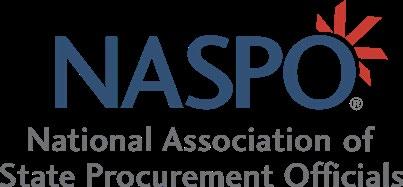





grateful for the support of these leading investors in the work of CSG. To join the CSG Associates program, contact the CSG development team at associates@csg.org or csg.org/sponsorship CSG LEADERSHIP CIRCLE THANK YOU!
We're

3 BRANCHES OF GOVERNMENT • 56 STATES AND TERRITORIES • 4 STRONG REGIONS OVER 90 YEARS OF ADVANCING THE COMMON GOOD
STRONGER TOGETHER
The Council of State Governments is the nation’s largest nonpartisan organization serving all three branches of government. CSG works to connect, inform, inspire and empower the elected and appointed officials who — together — build stronger states and a stronger nation.
Learn more about how we serve you and your fellow community of state leaders.


































 Dense Sampson explains Georgia’s use of sine die to her classmates during the 2023 Staff Academy for Government Excellence (SAGE) in Atlanta on Nov. 15. SAGE is a professional leadership development program for Southern state legislative, judicial, executive and agency staff.
Photo credit: Shannon Belletti
Kansas Sen. Elaine Bowers (left) joins host Becky Kiser and fellow lawmakers, including Rep. Ken Rahjes, for the first episode of The Kansas Legislature by Smoky Hills PBS on Feb. 2.
Dense Sampson explains Georgia’s use of sine die to her classmates during the 2023 Staff Academy for Government Excellence (SAGE) in Atlanta on Nov. 15. SAGE is a professional leadership development program for Southern state legislative, judicial, executive and agency staff.
Photo credit: Shannon Belletti
Kansas Sen. Elaine Bowers (left) joins host Becky Kiser and fellow lawmakers, including Rep. Ken Rahjes, for the first episode of The Kansas Legislature by Smoky Hills PBS on Feb. 2.







































